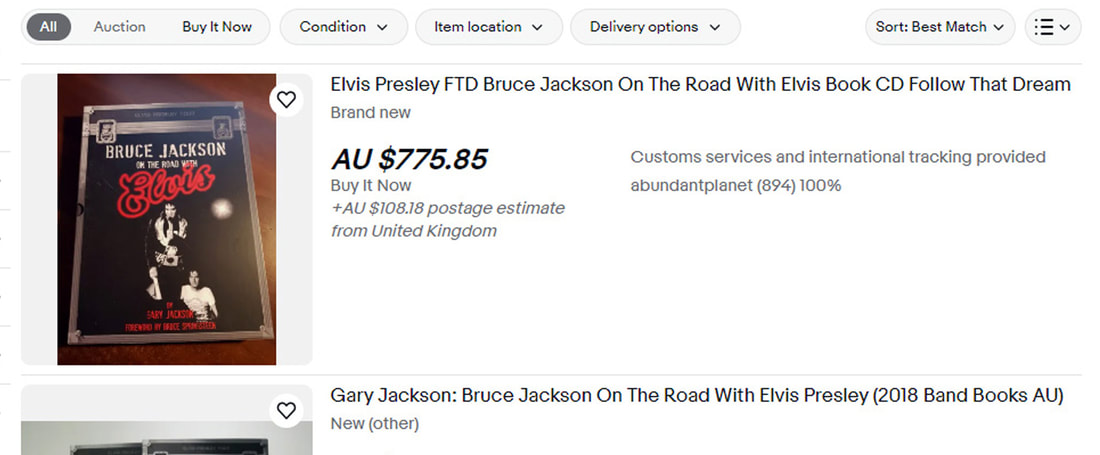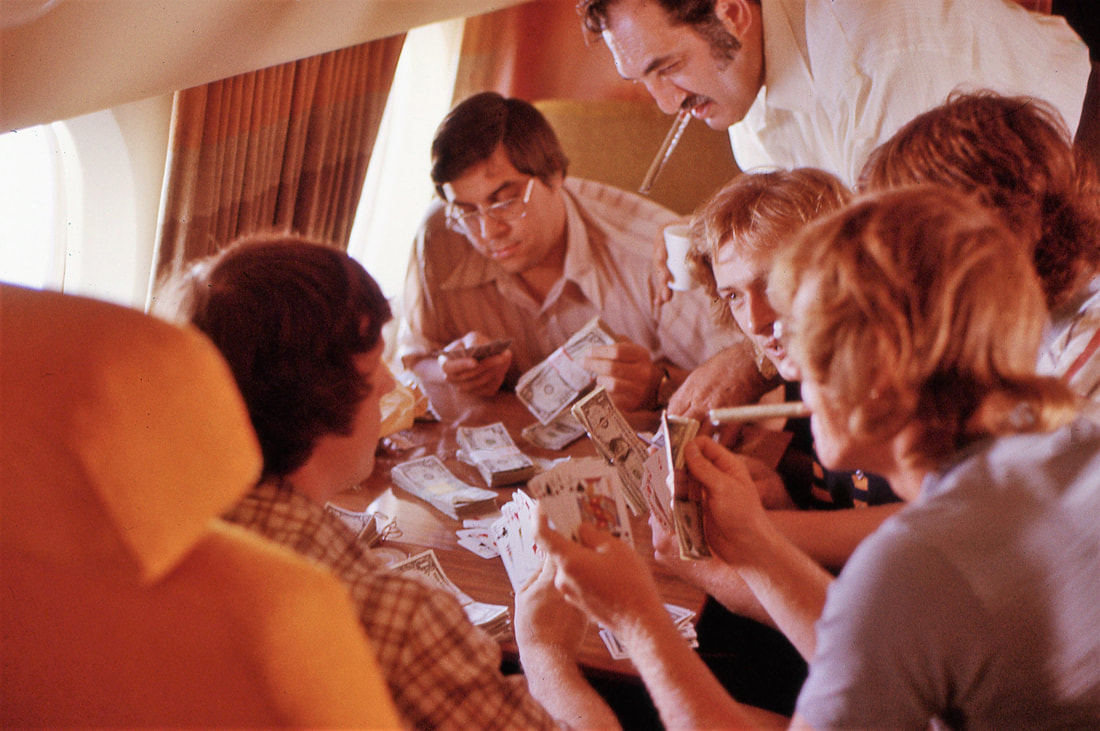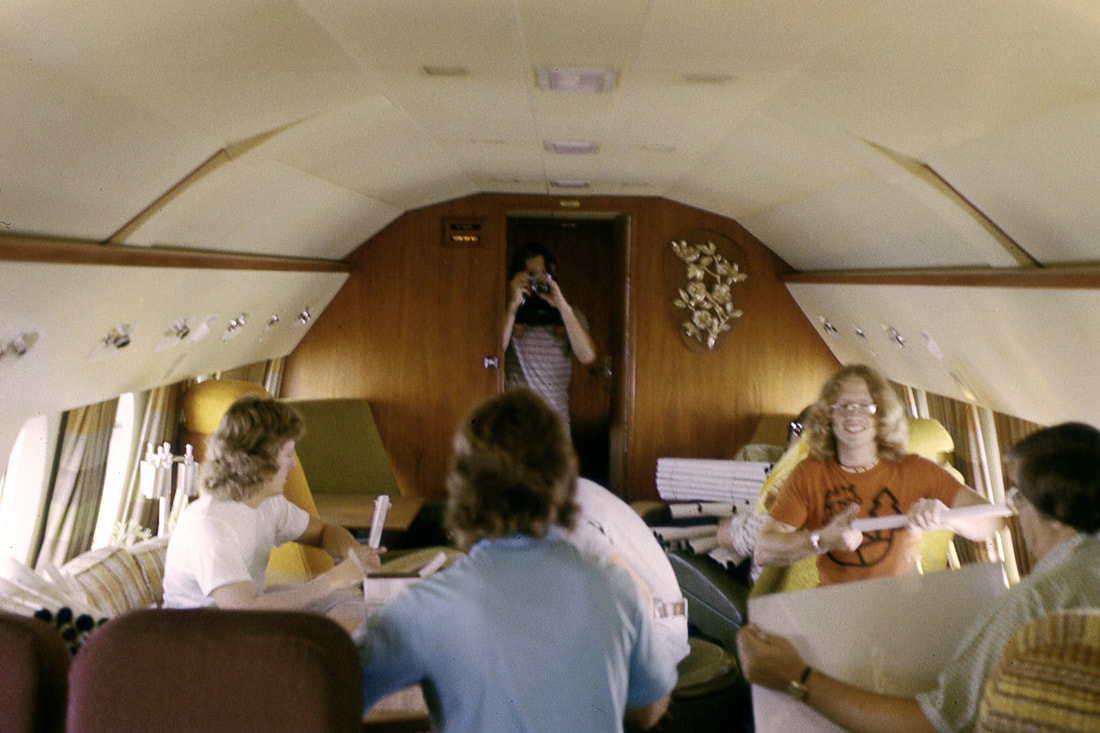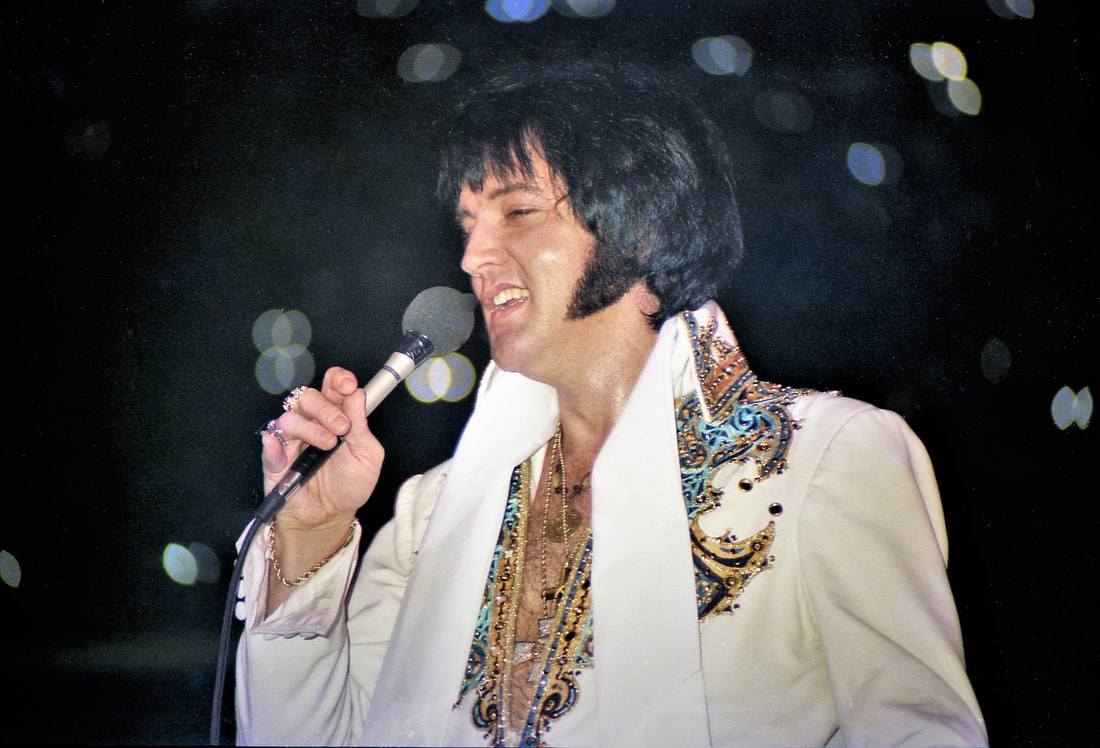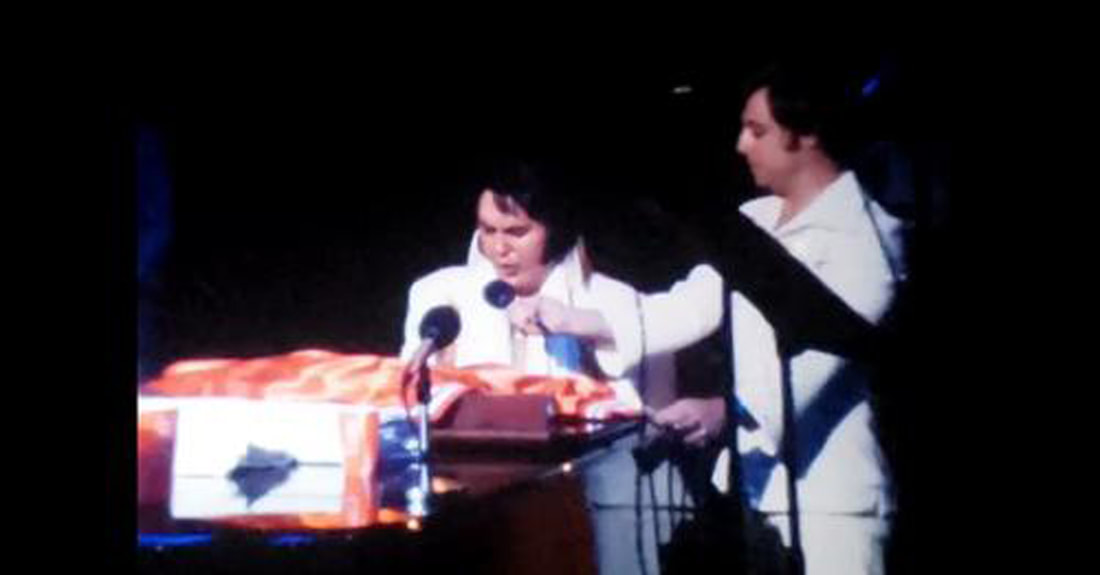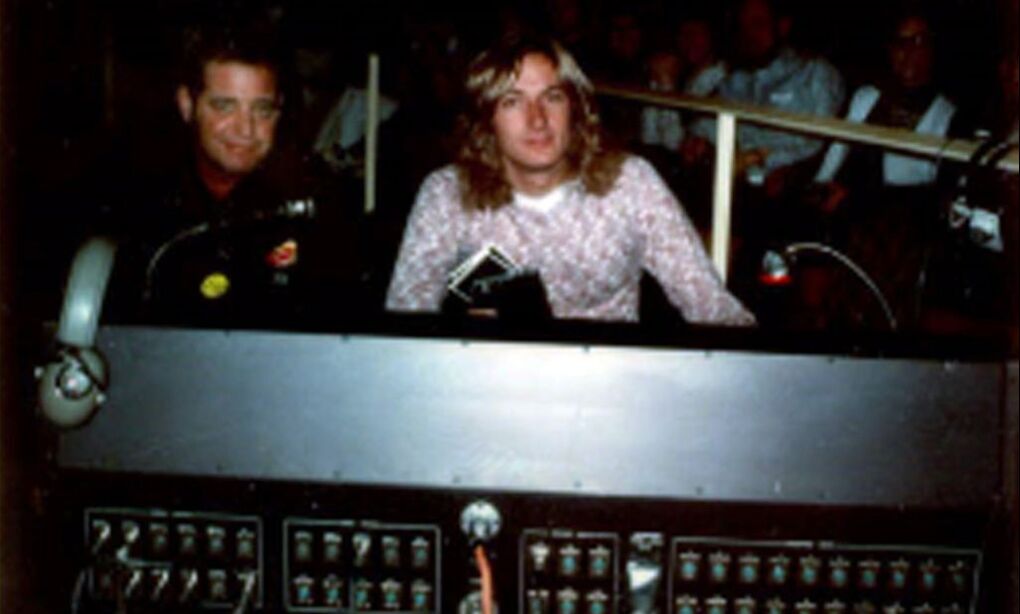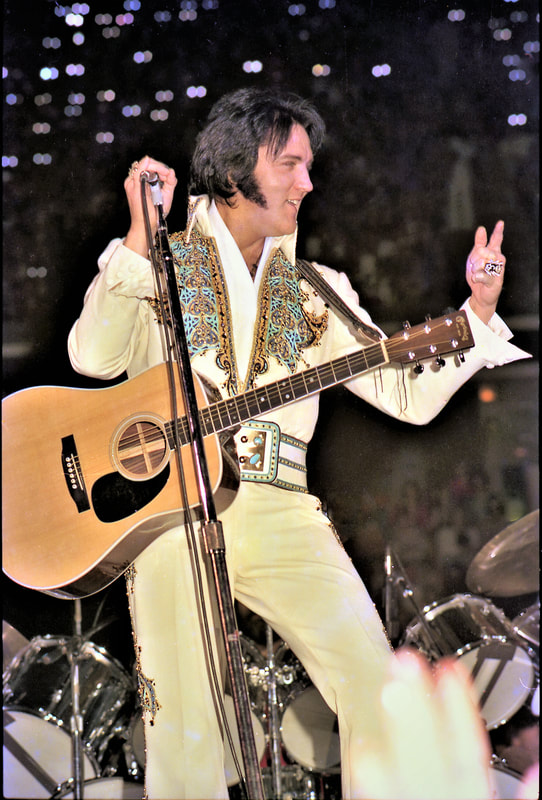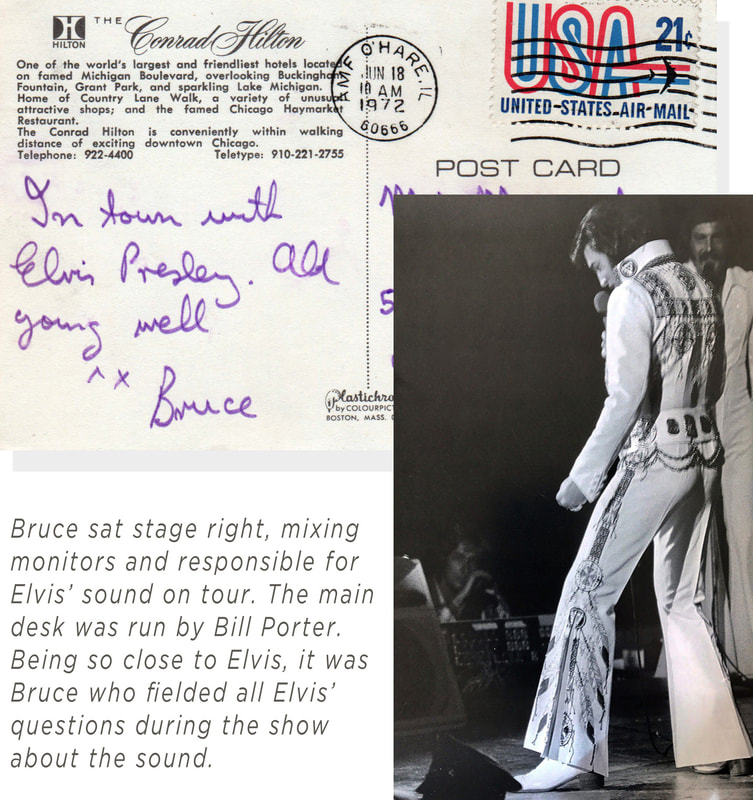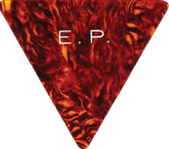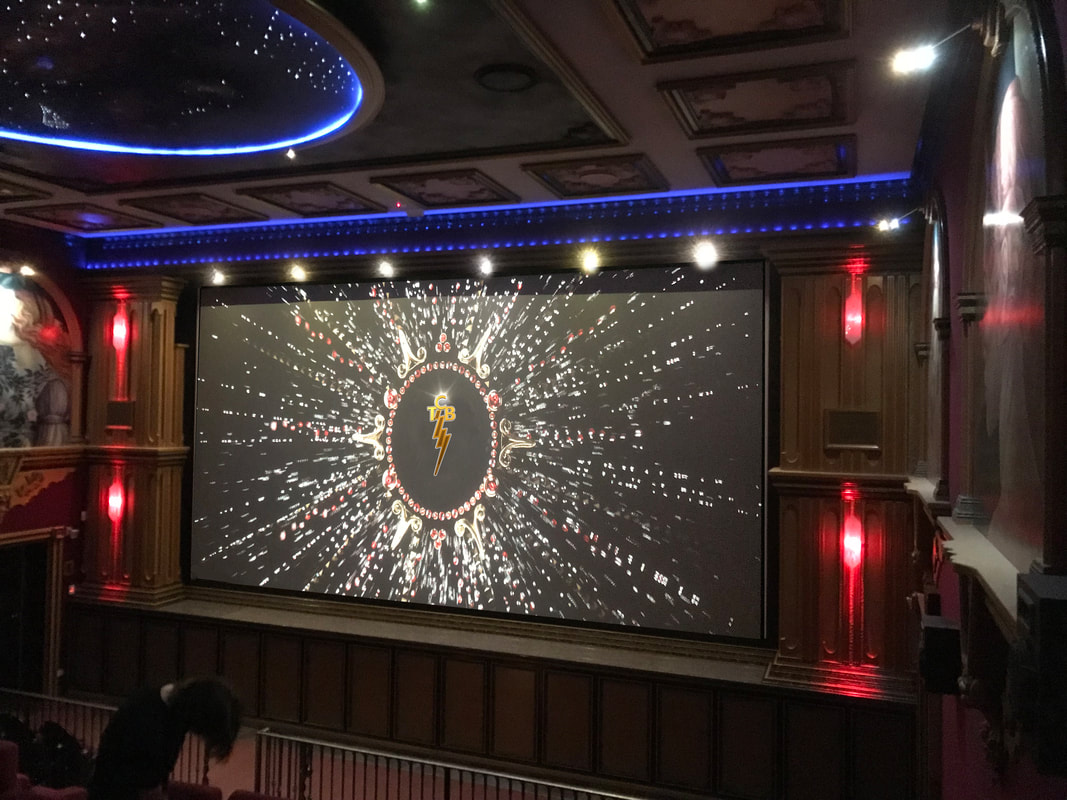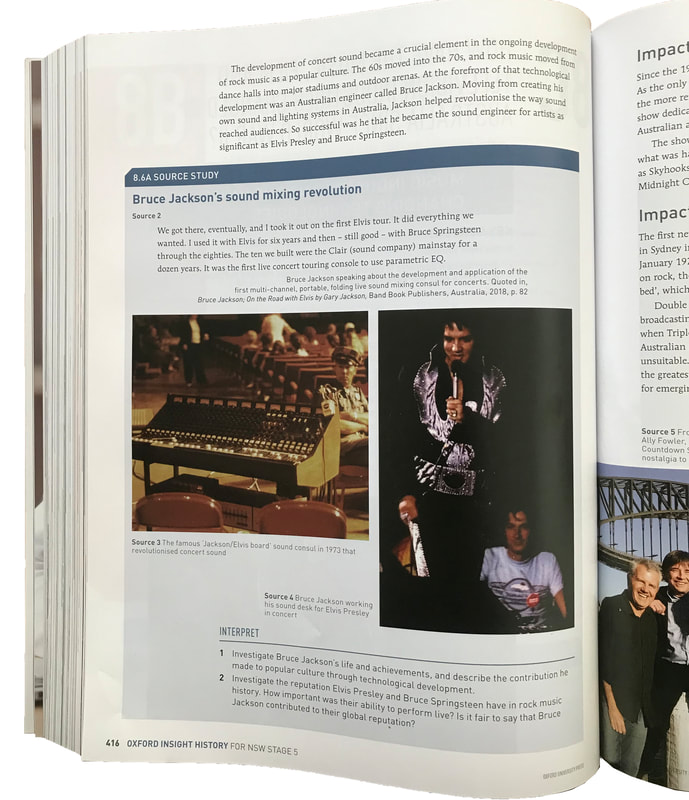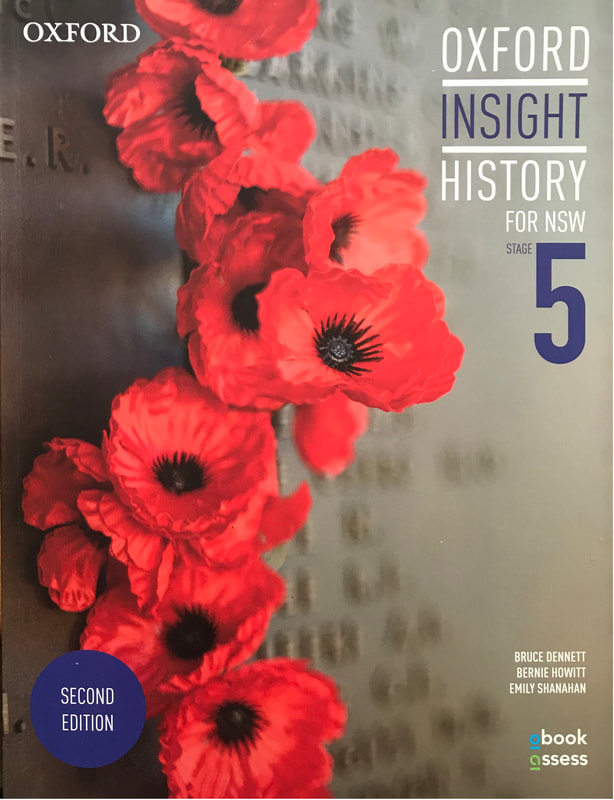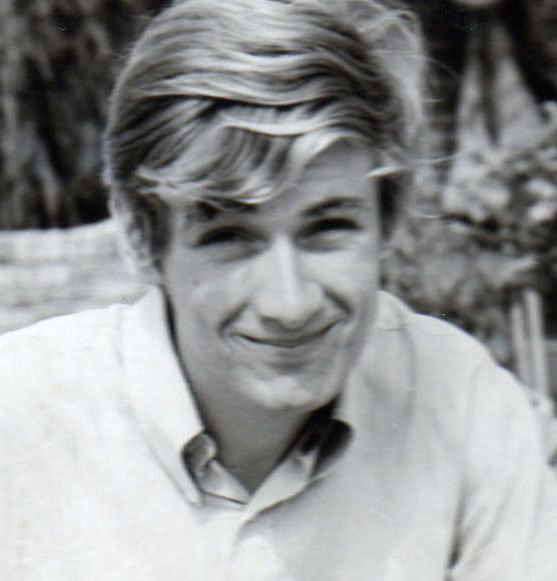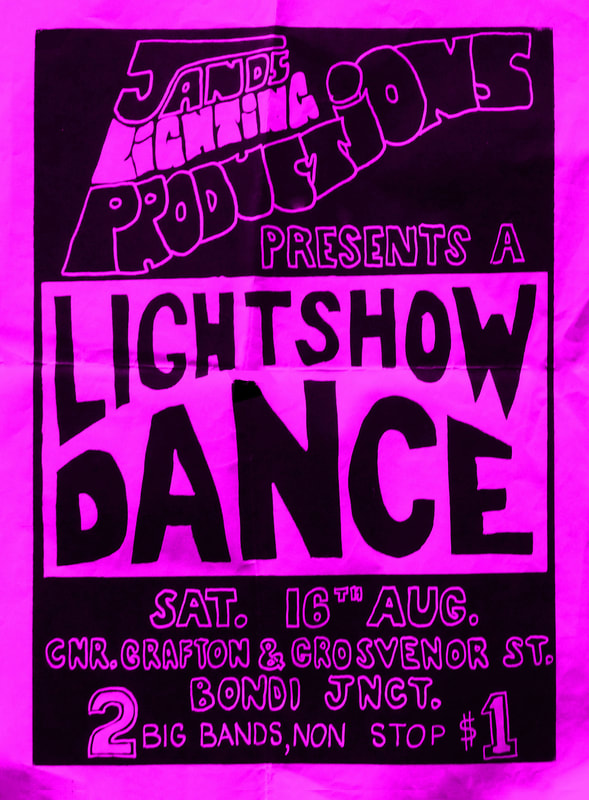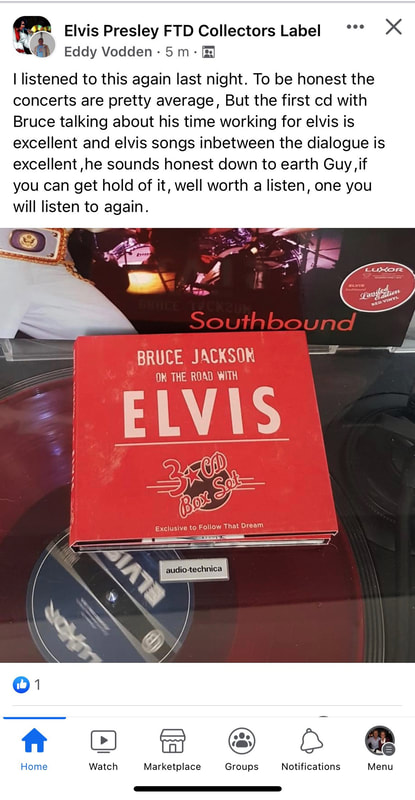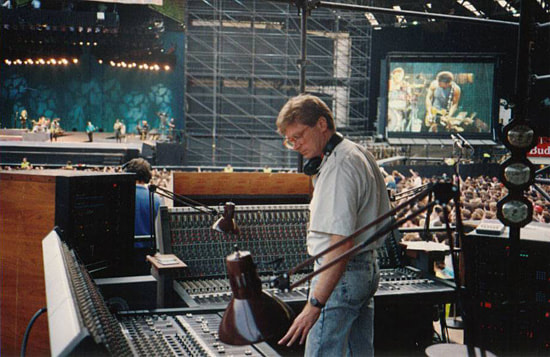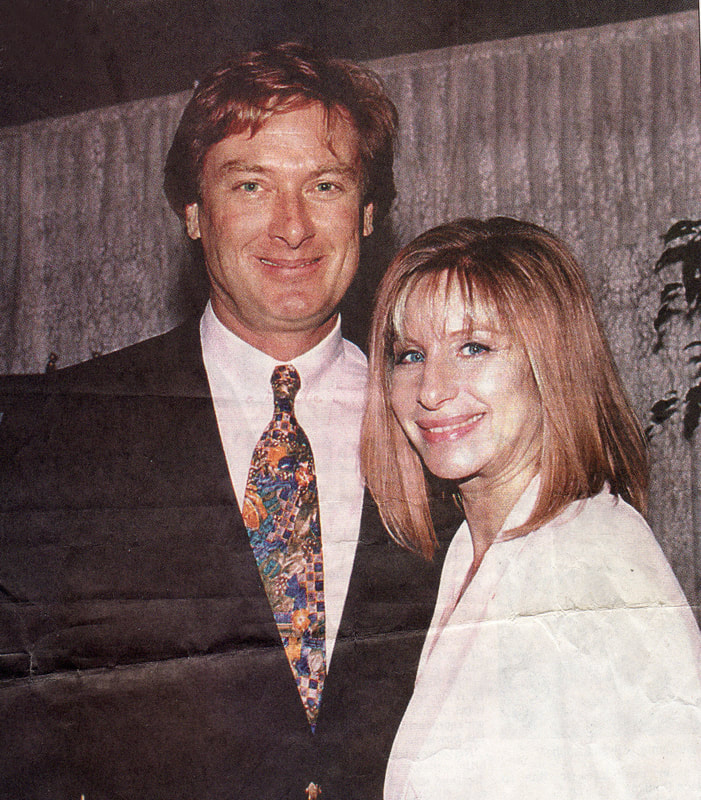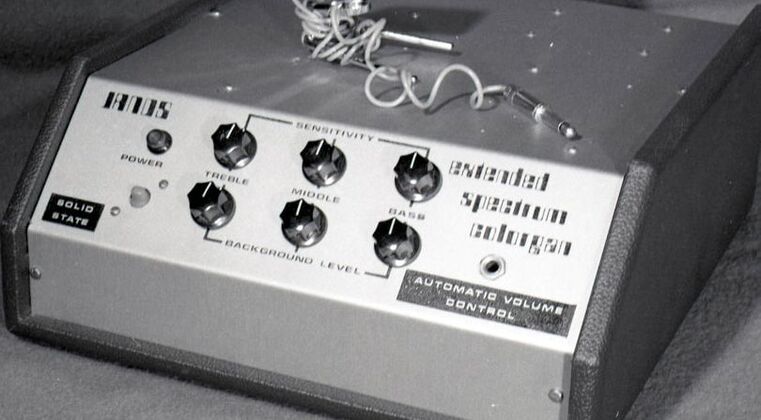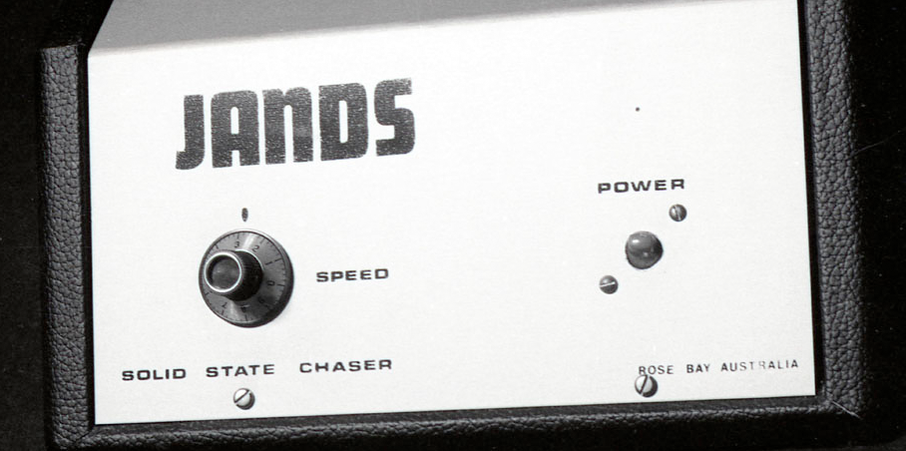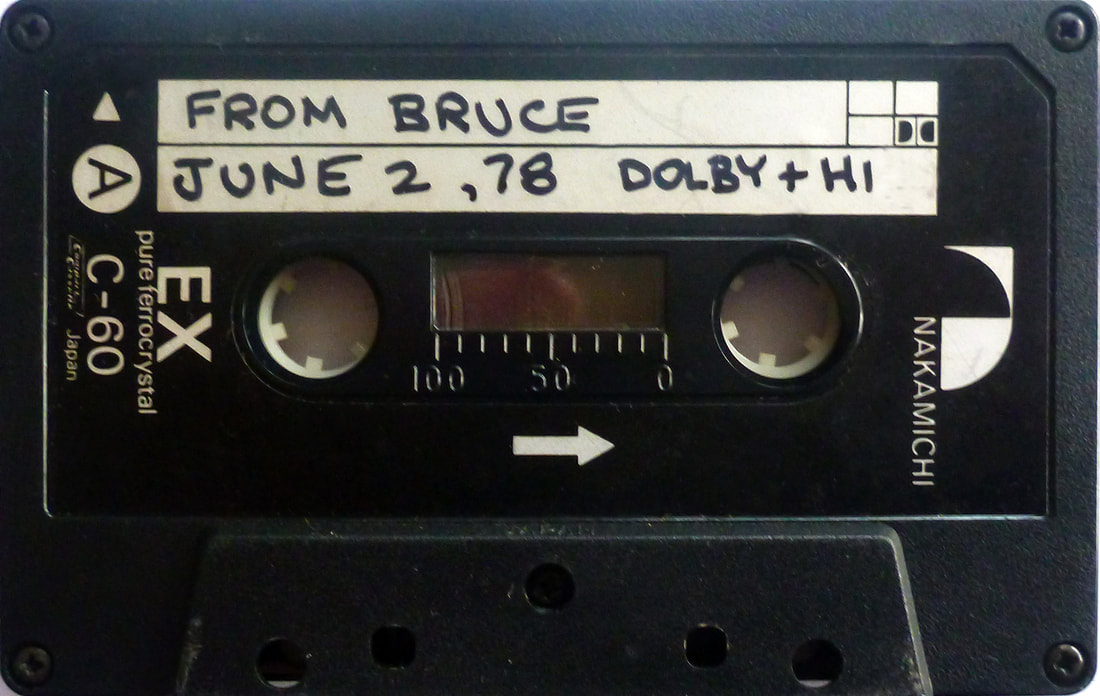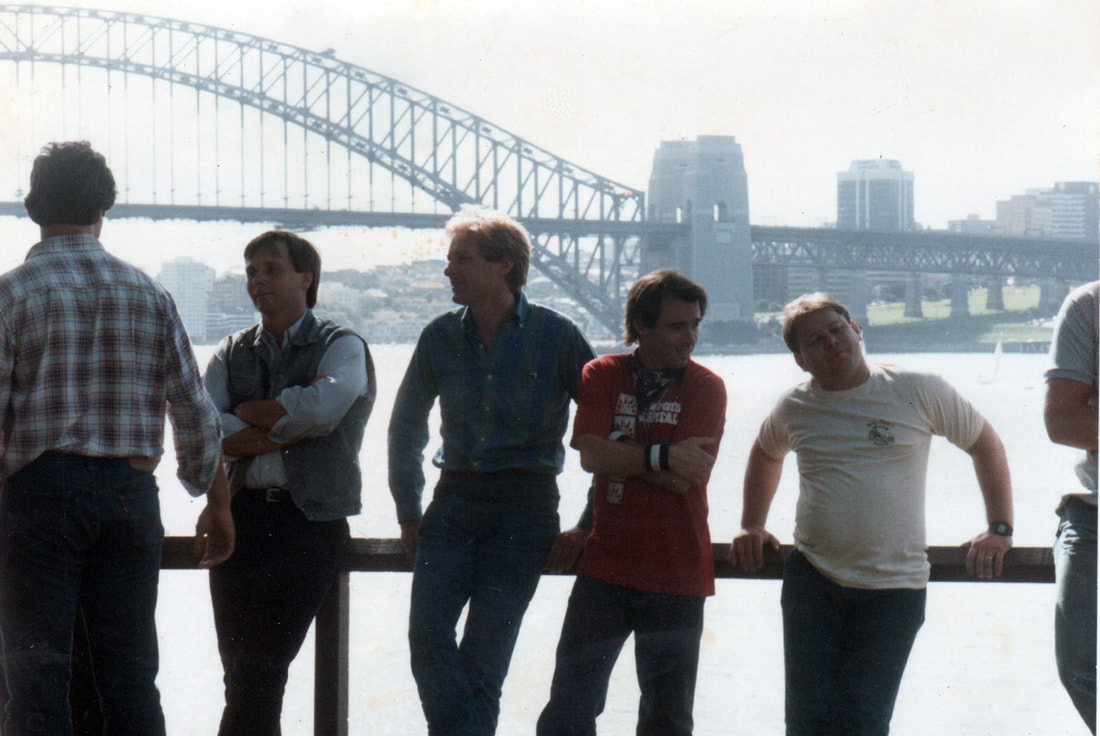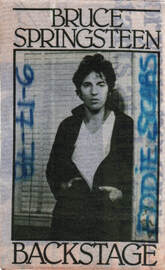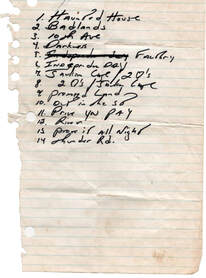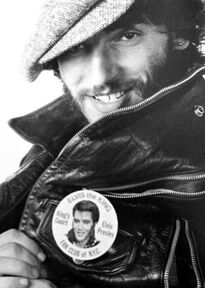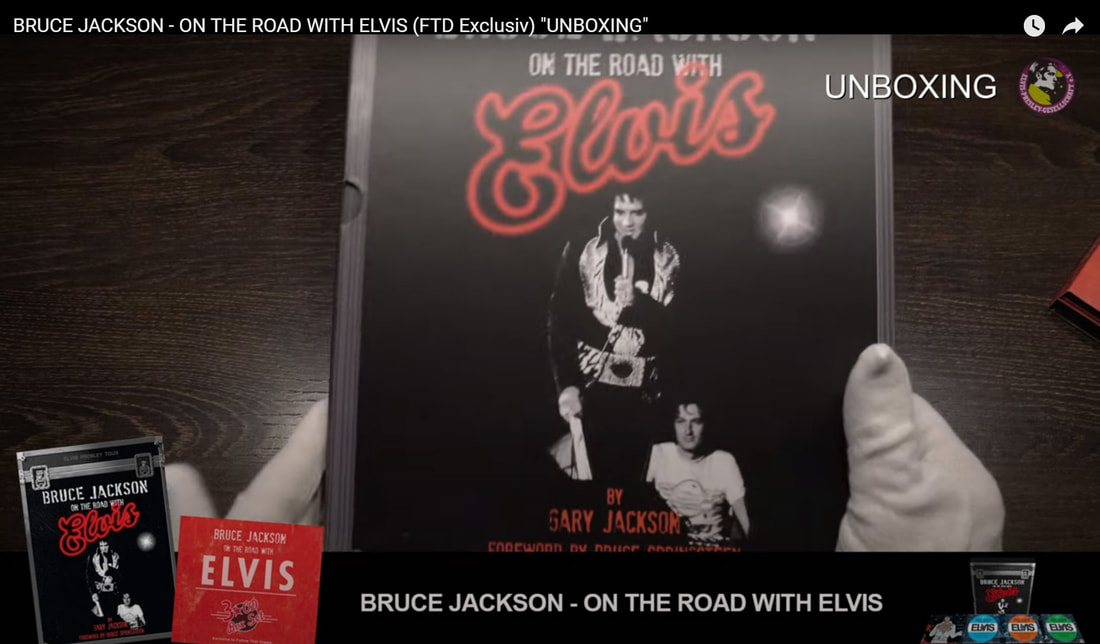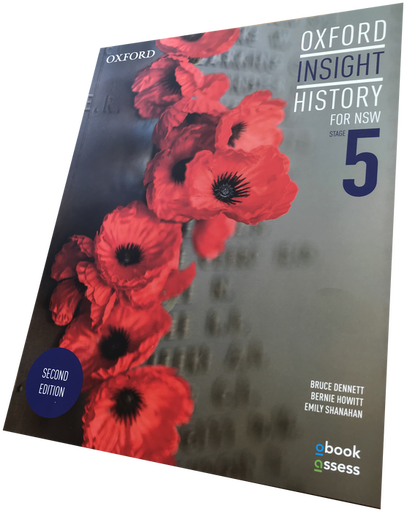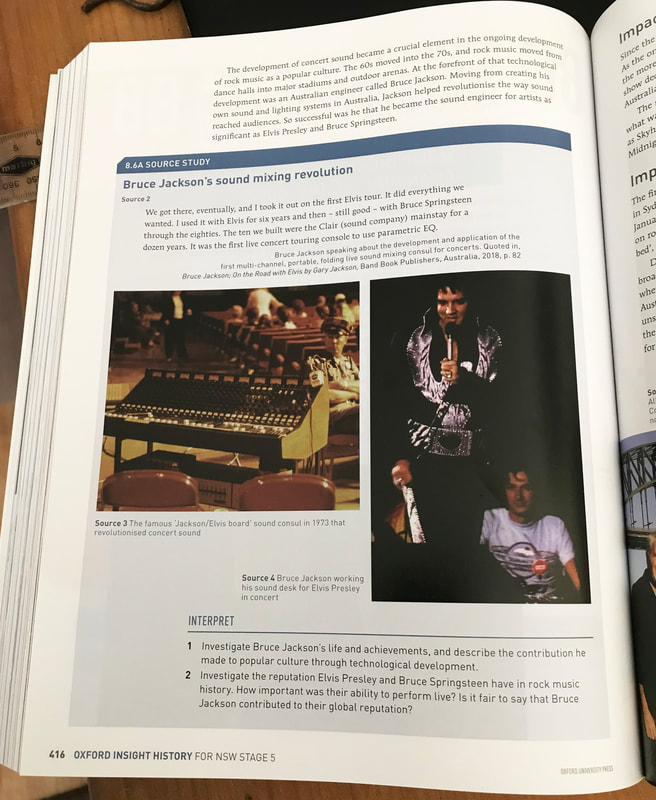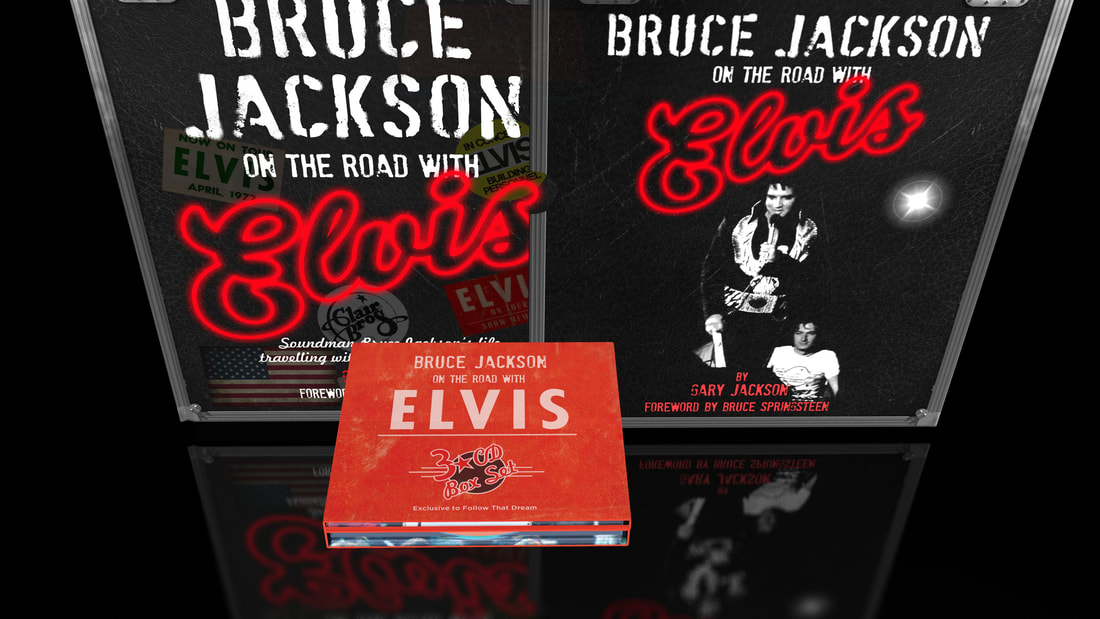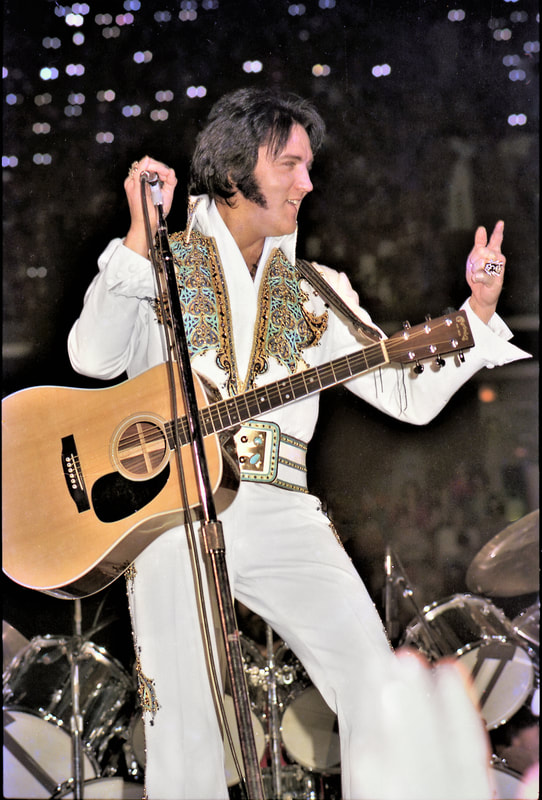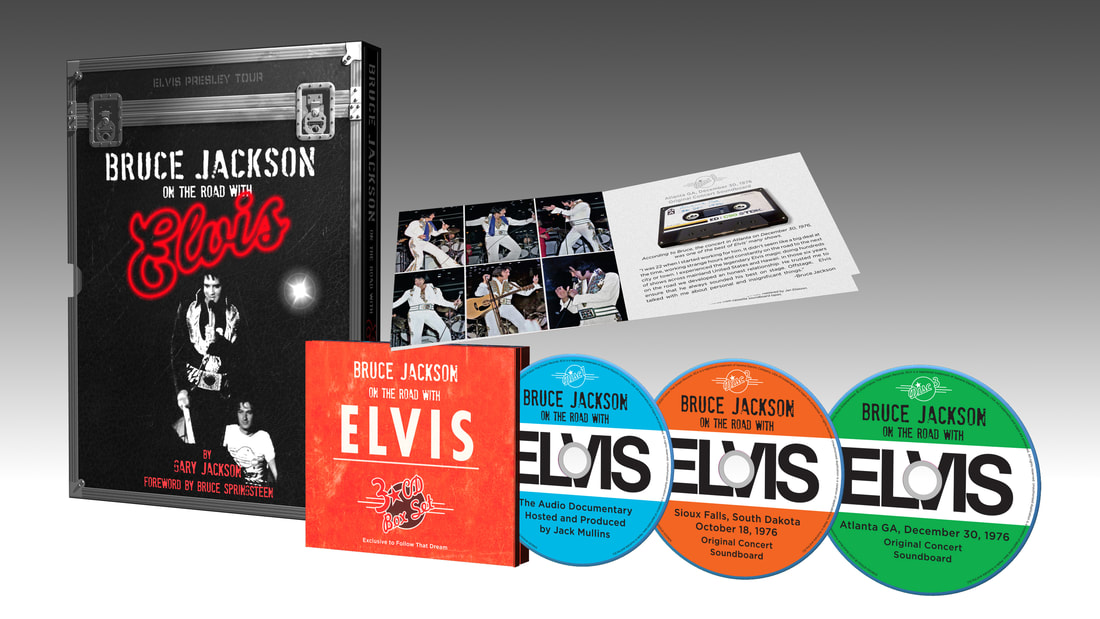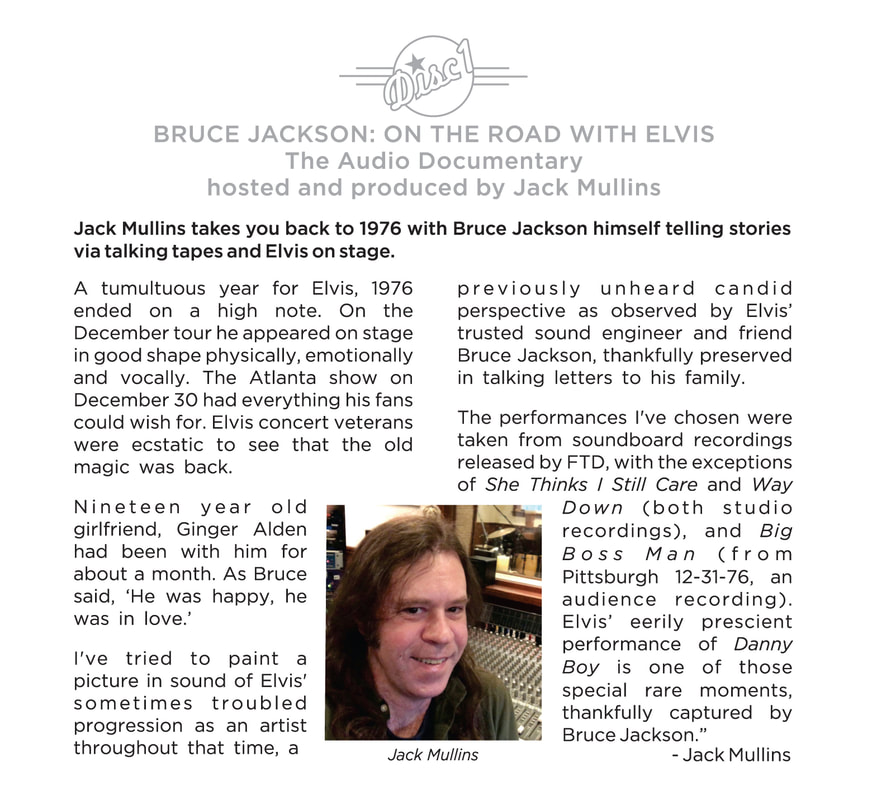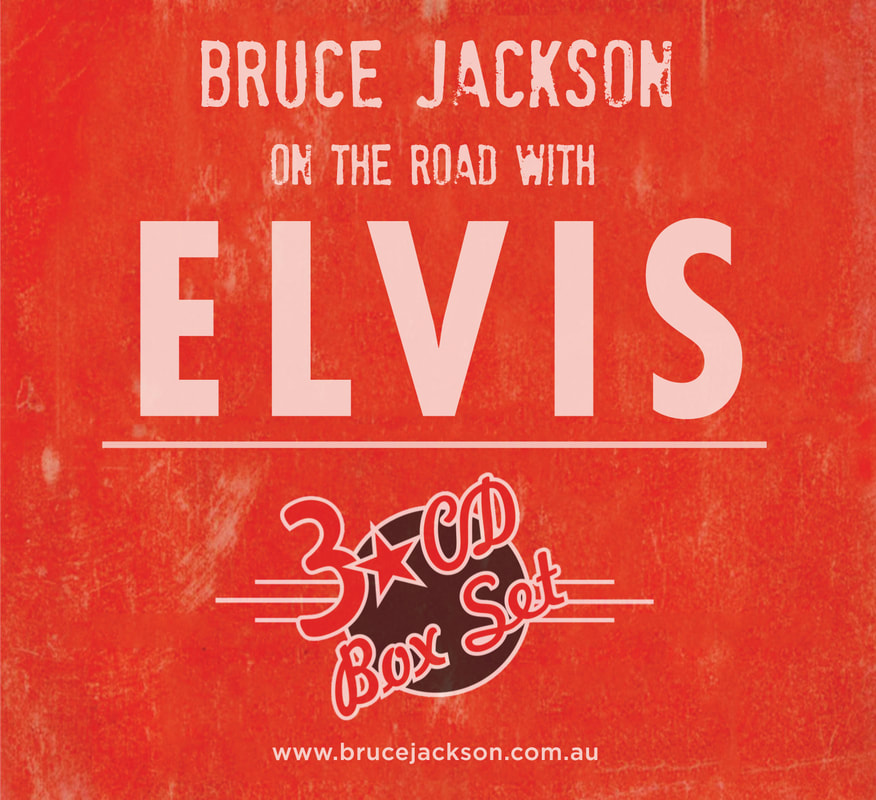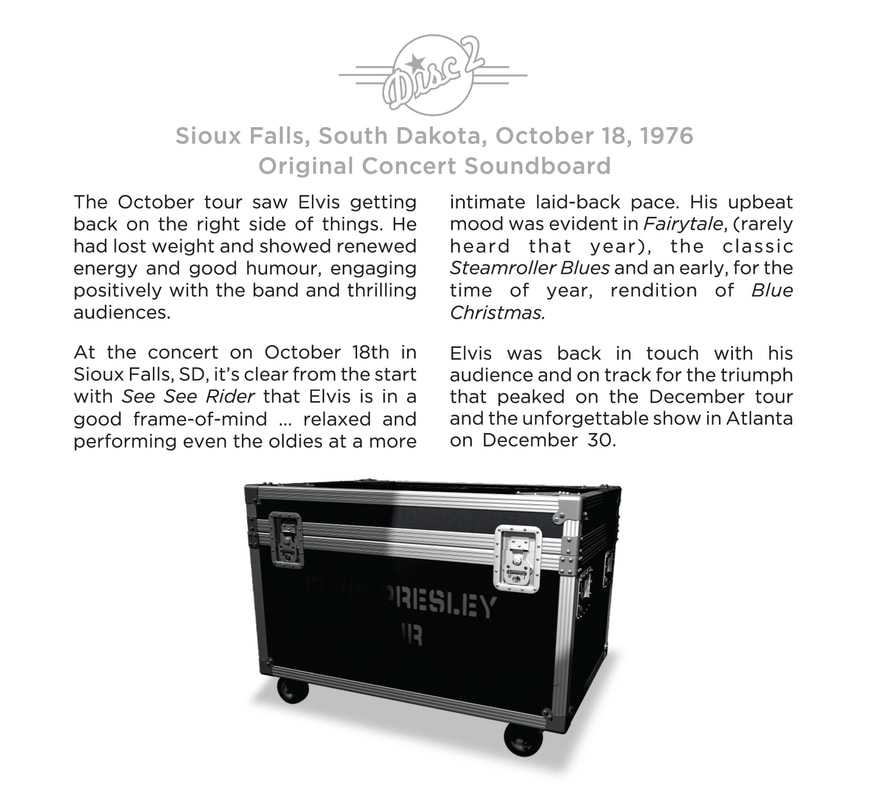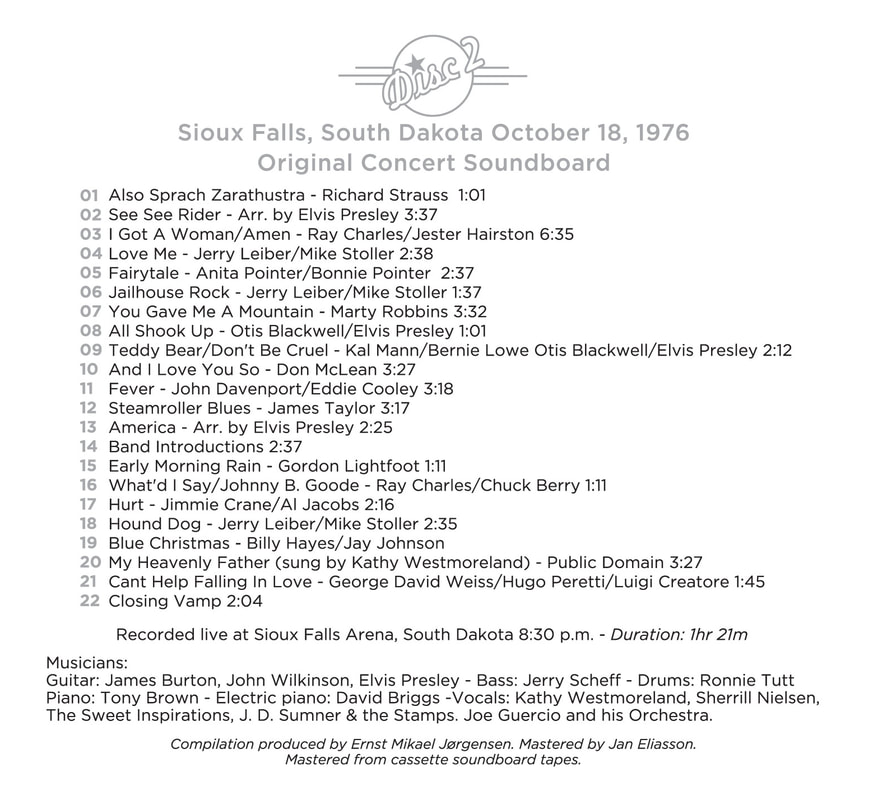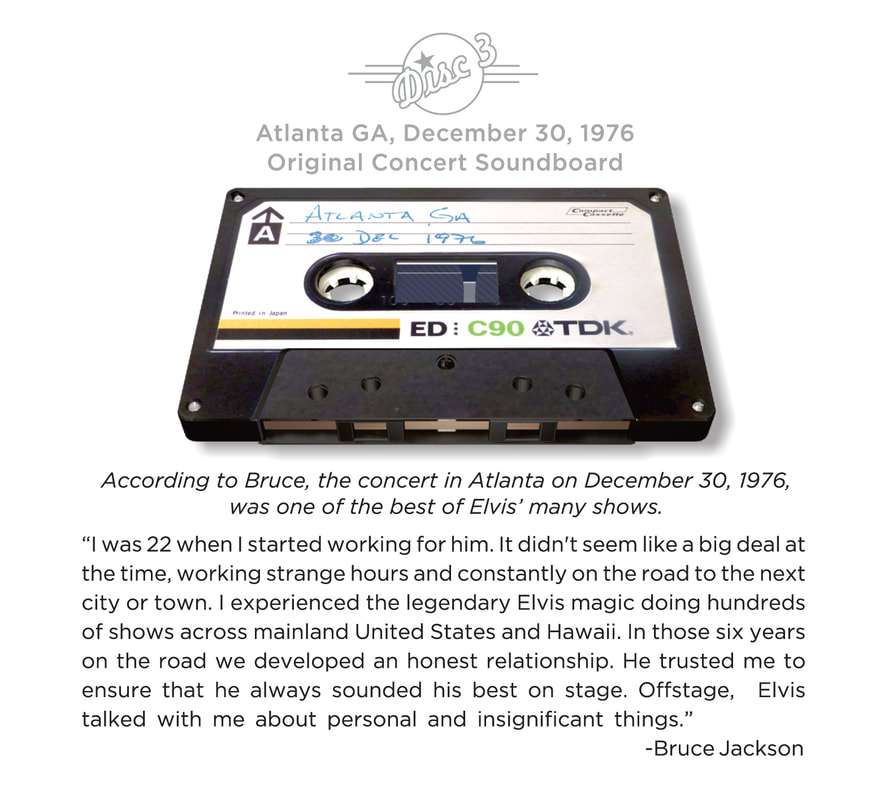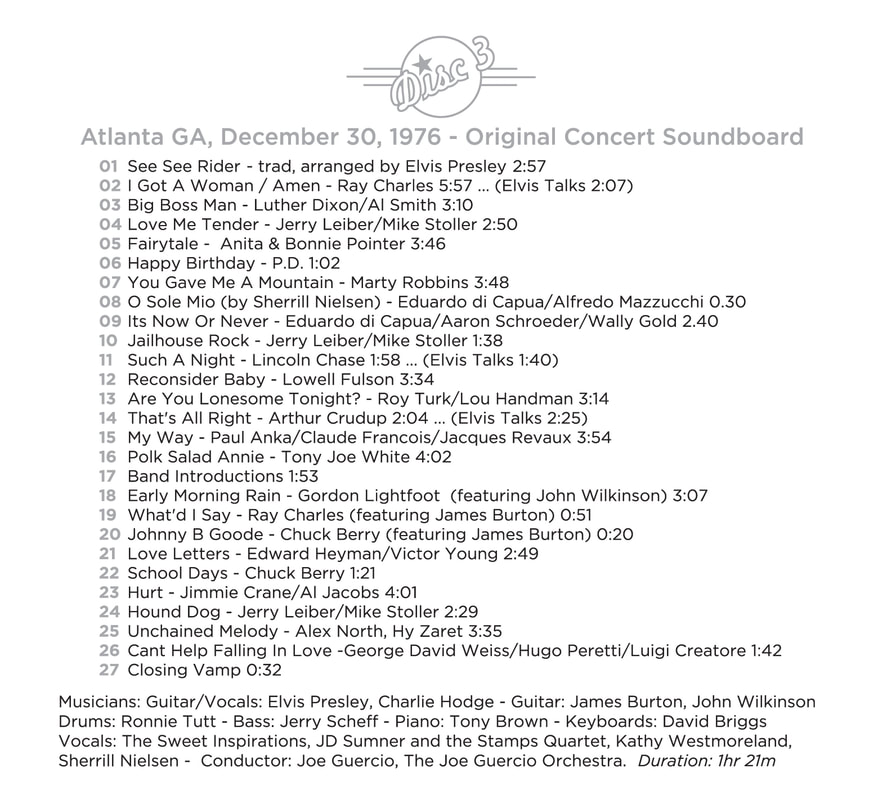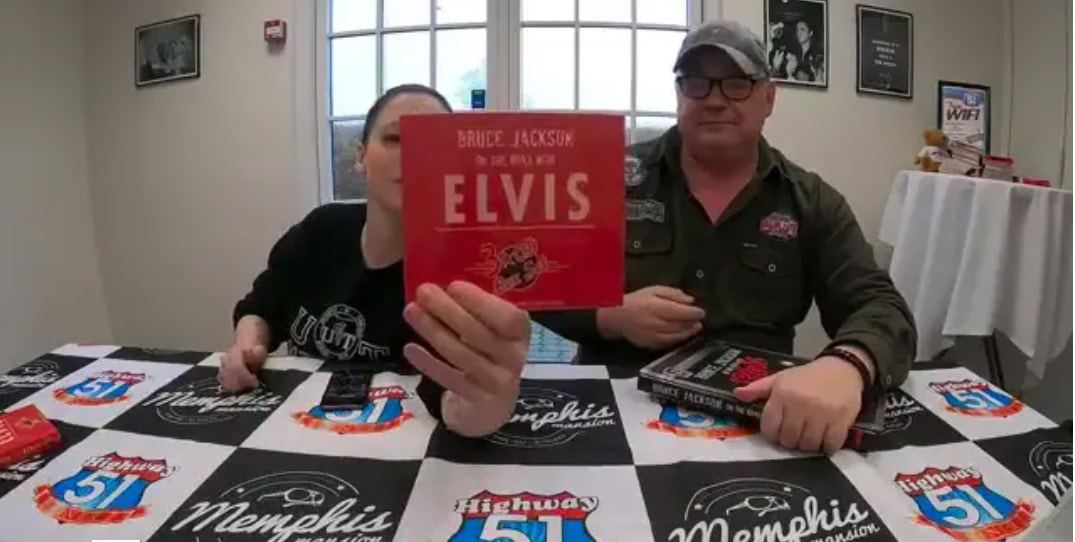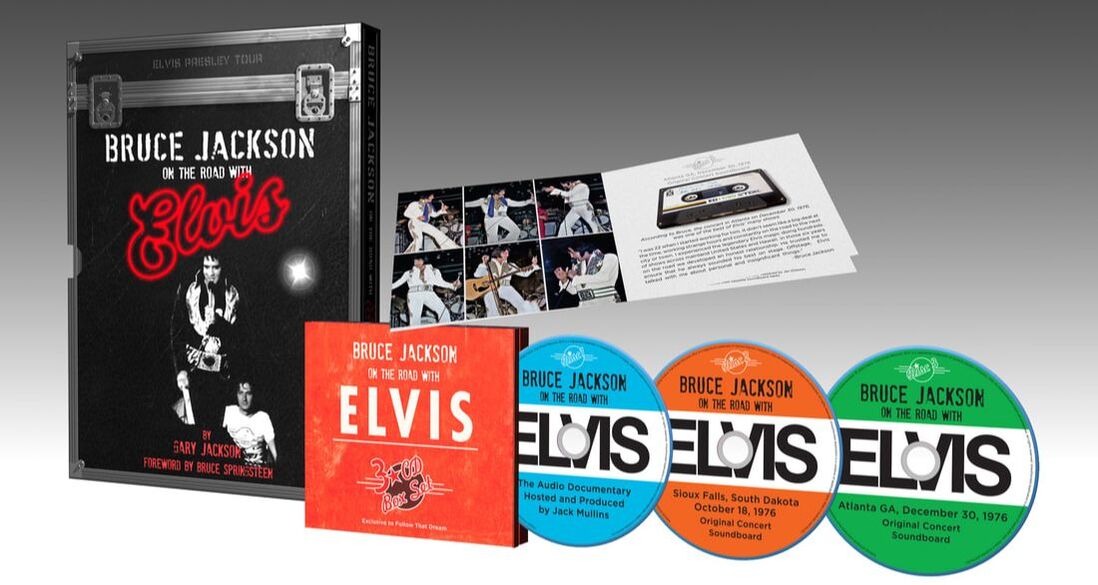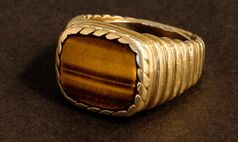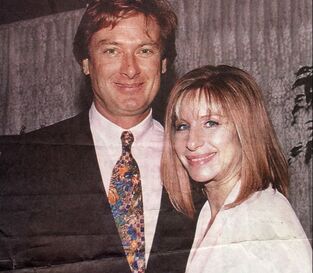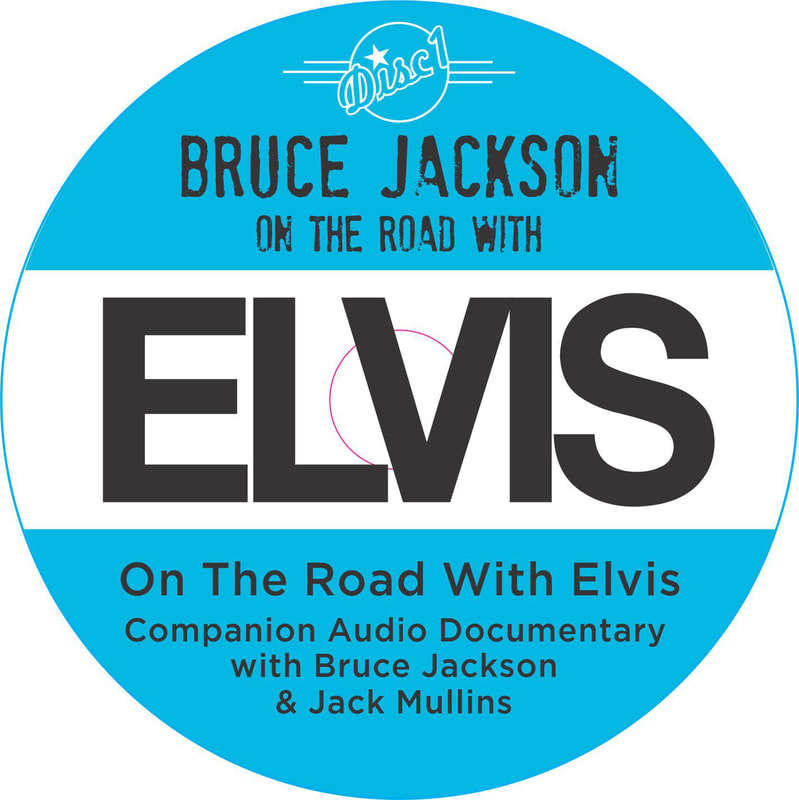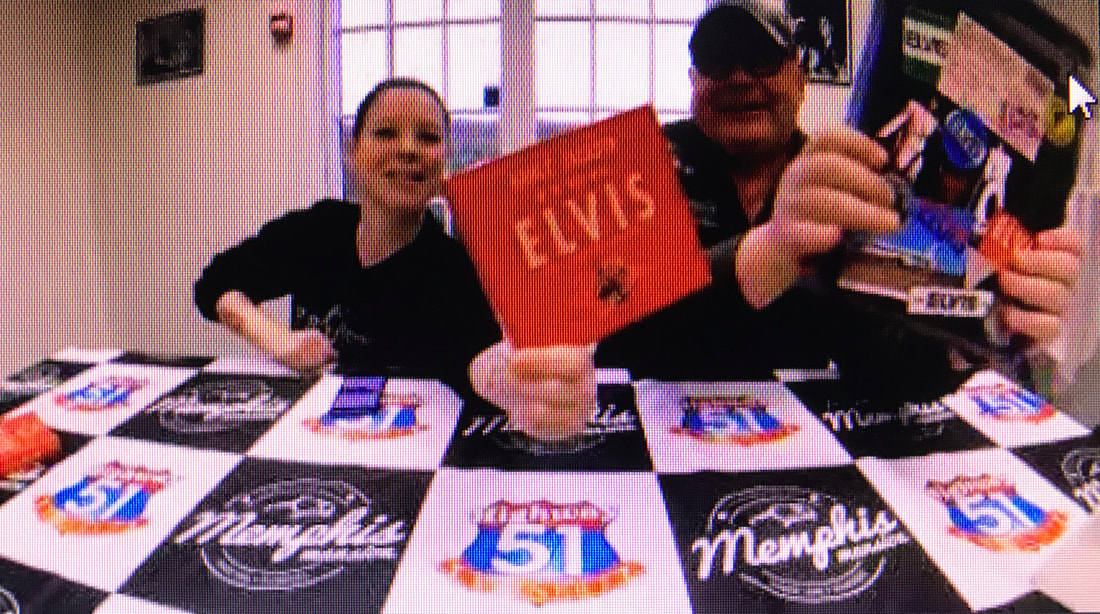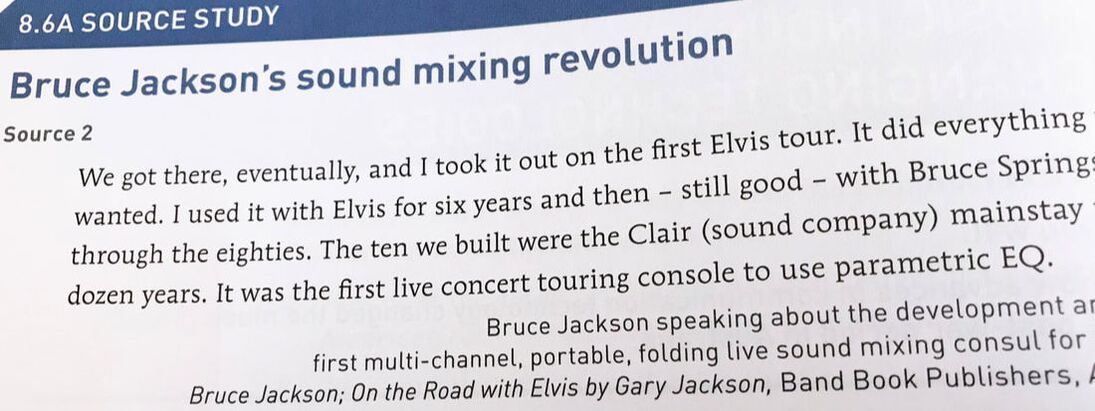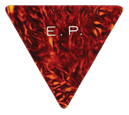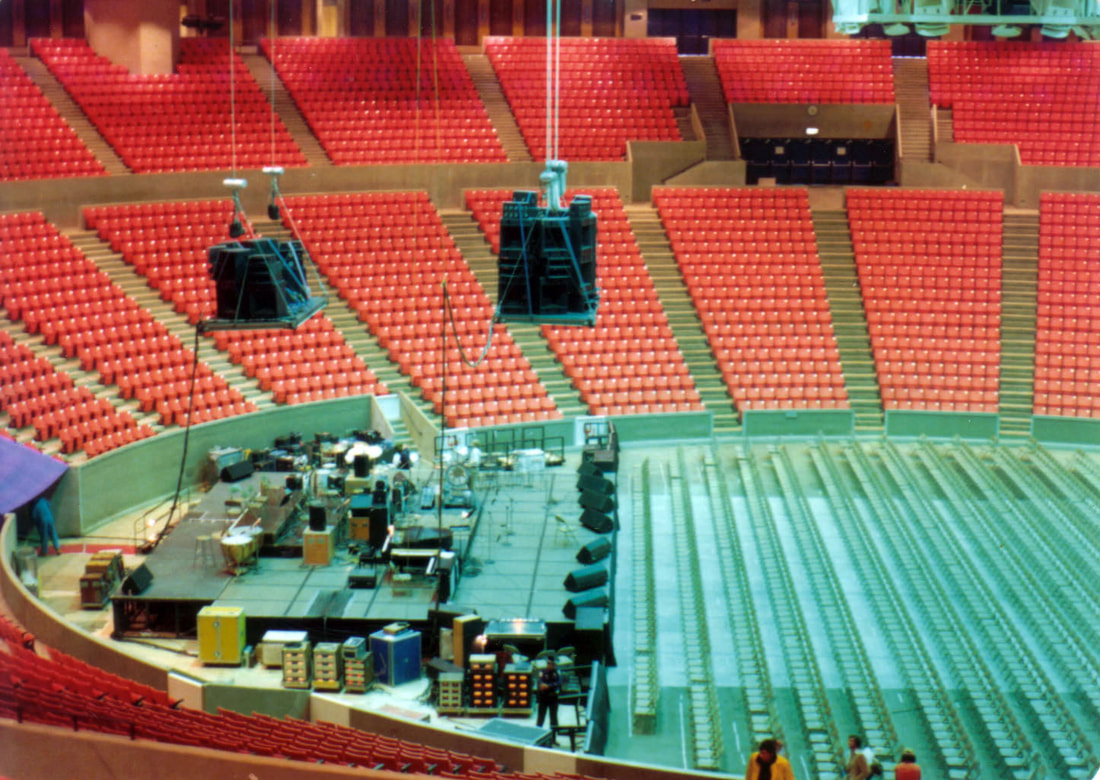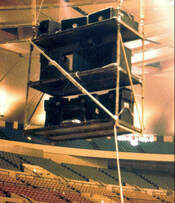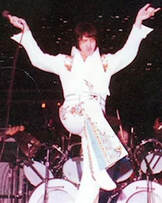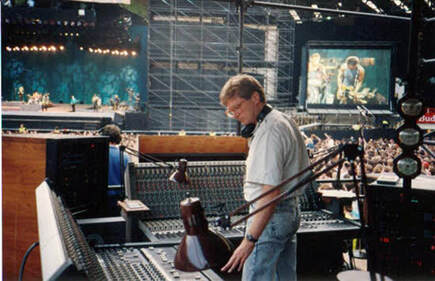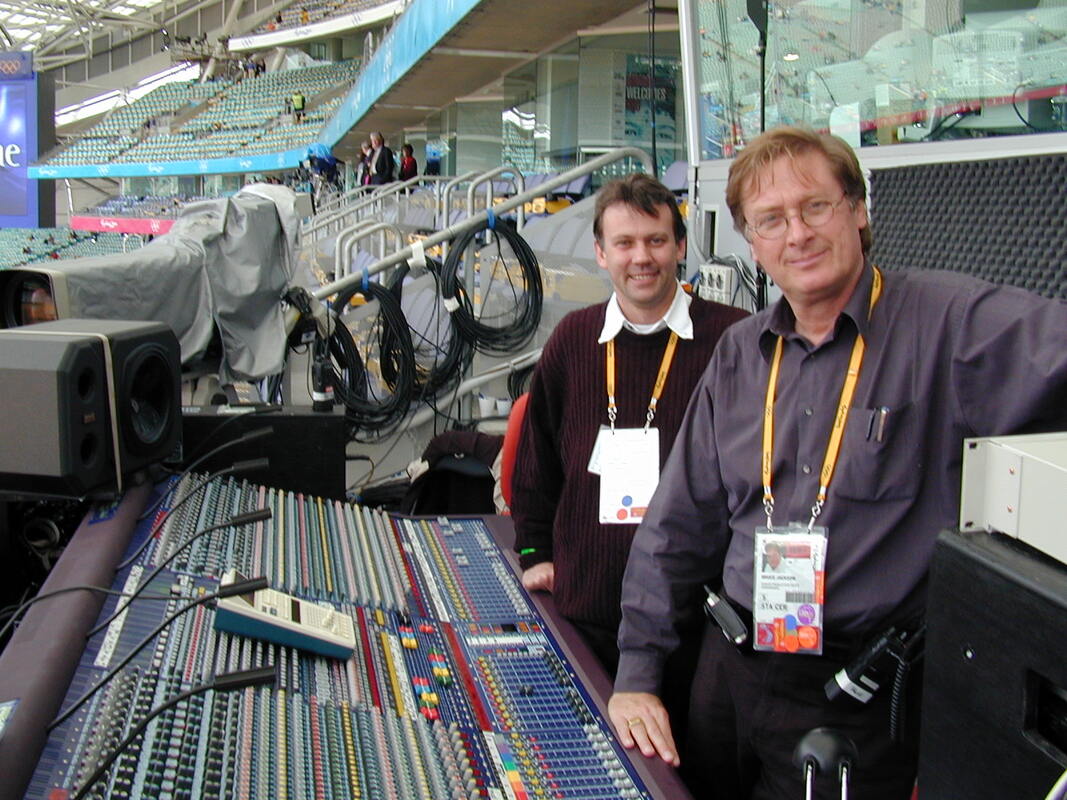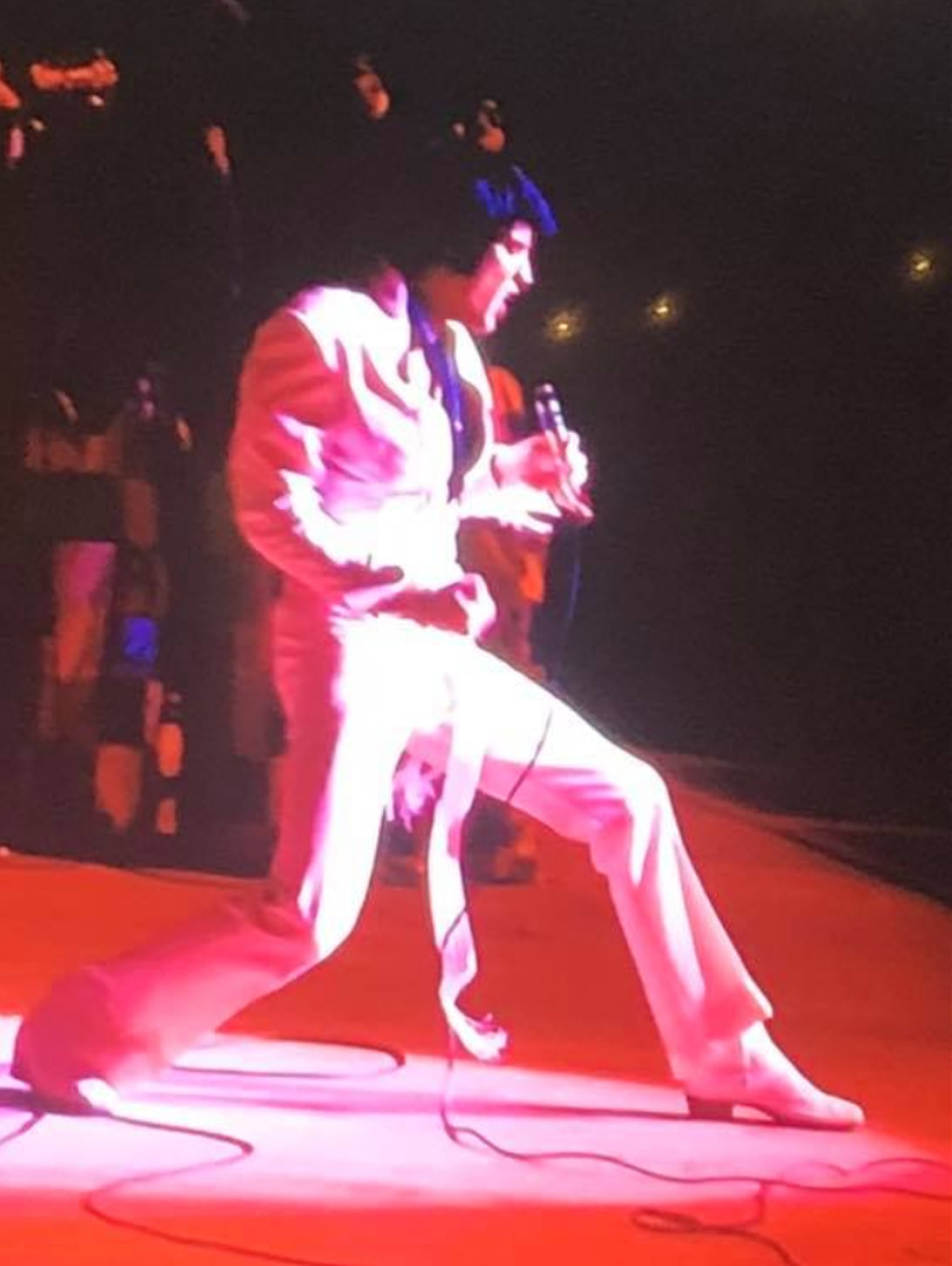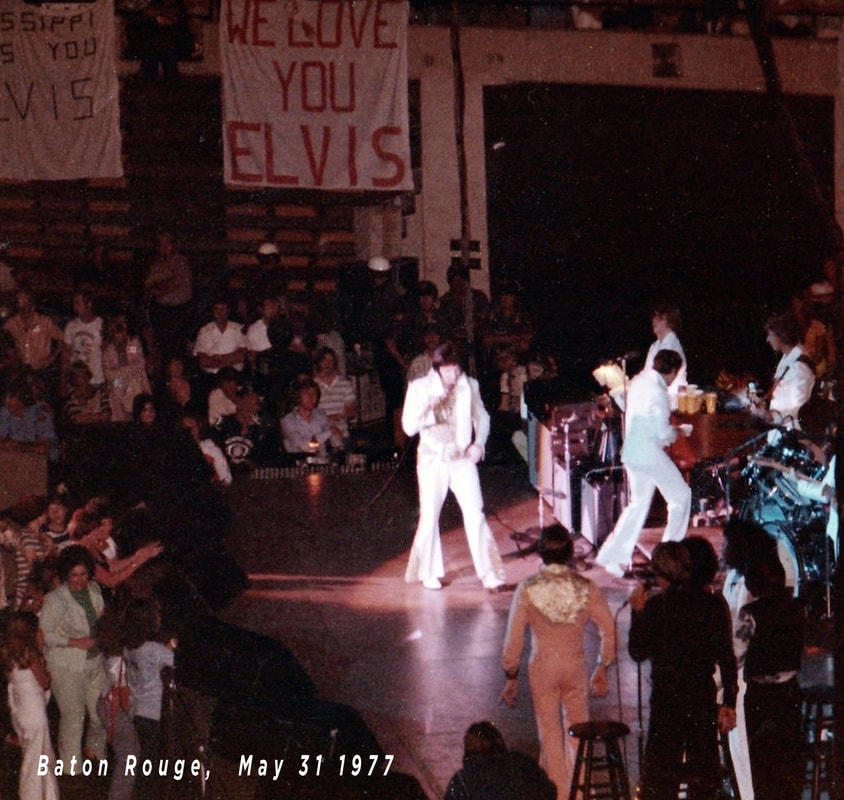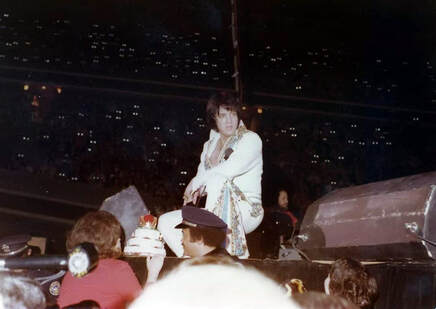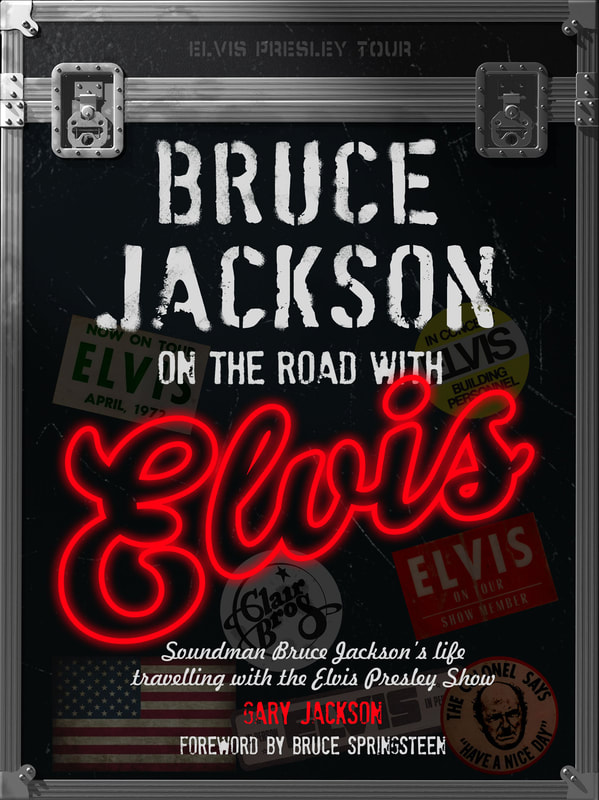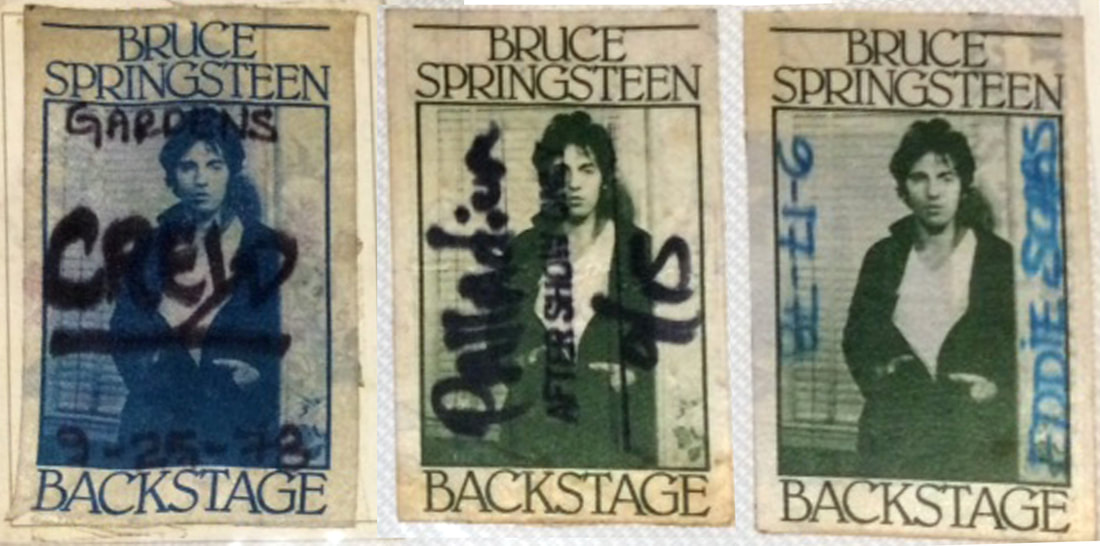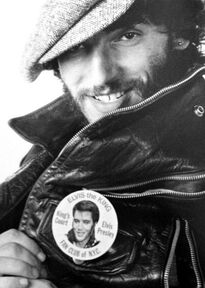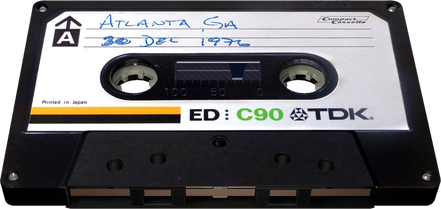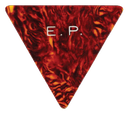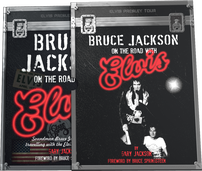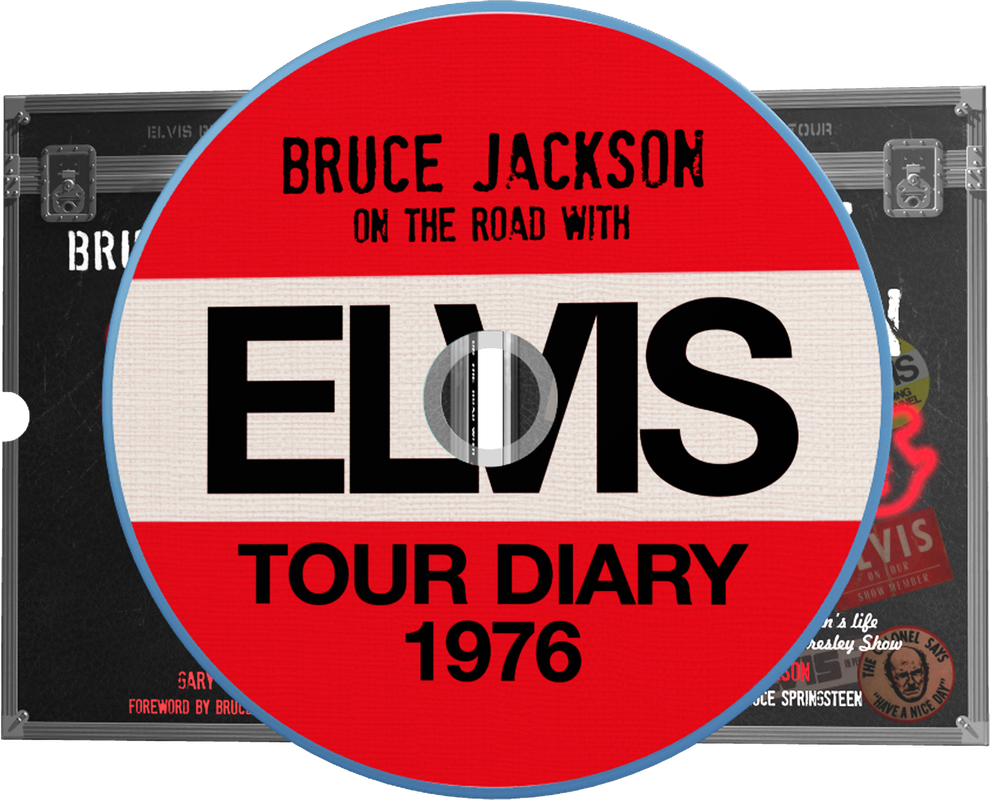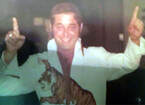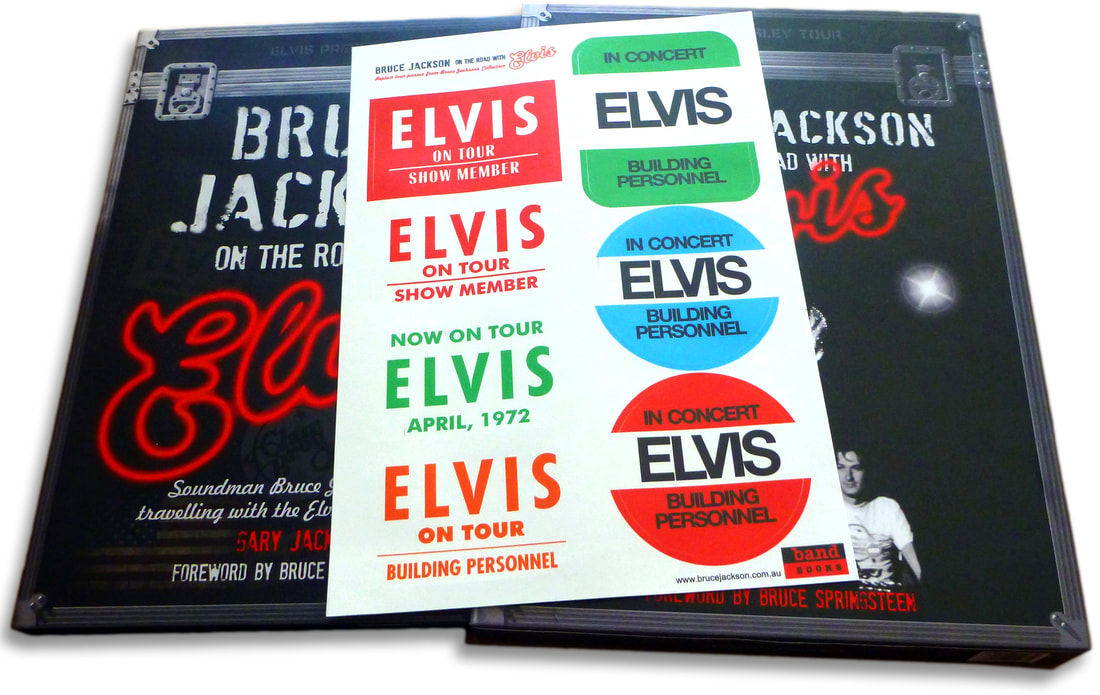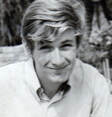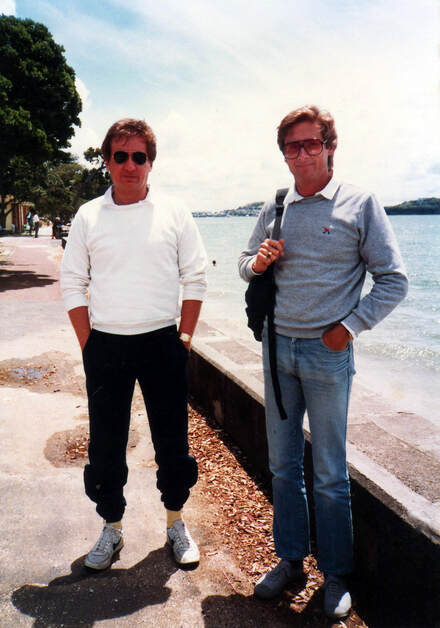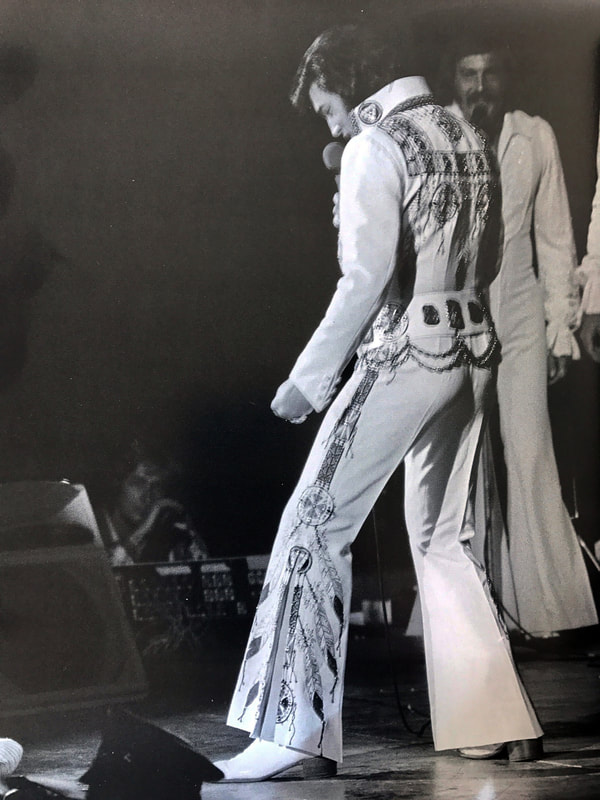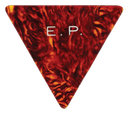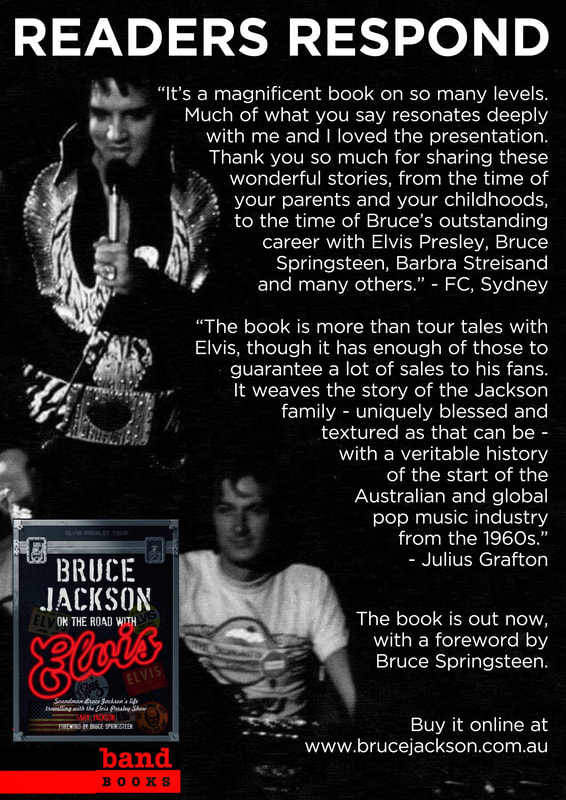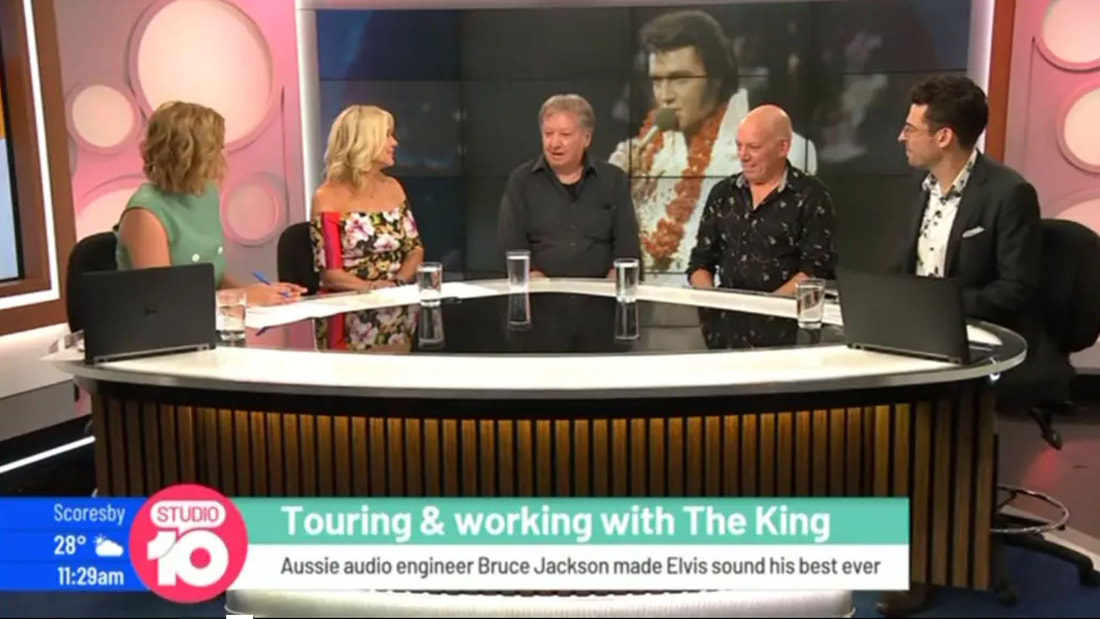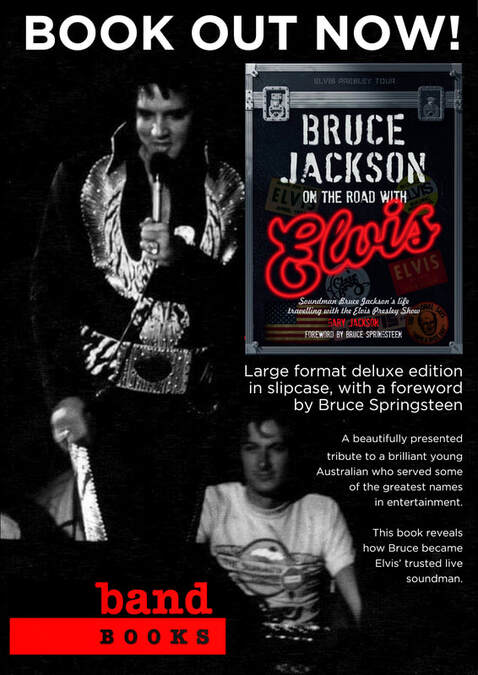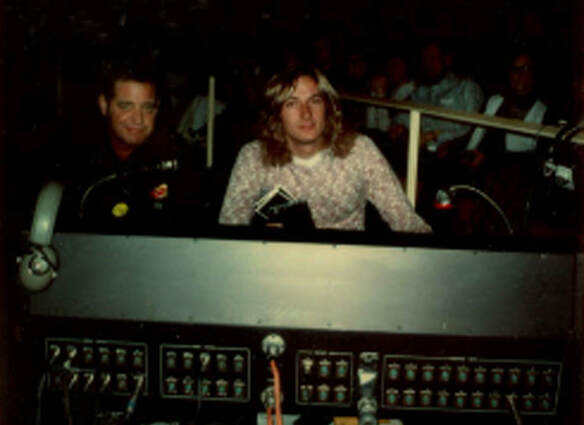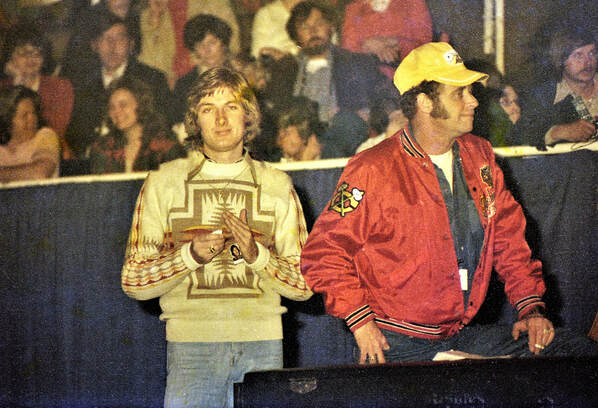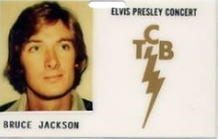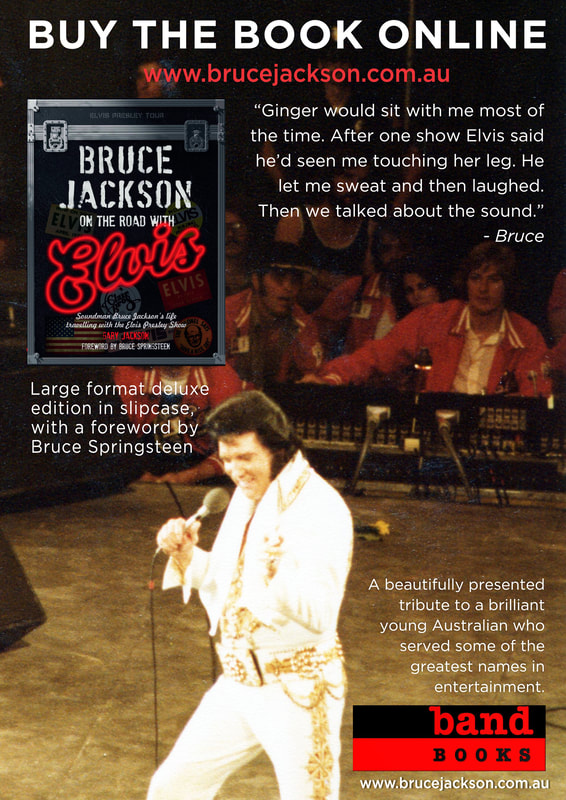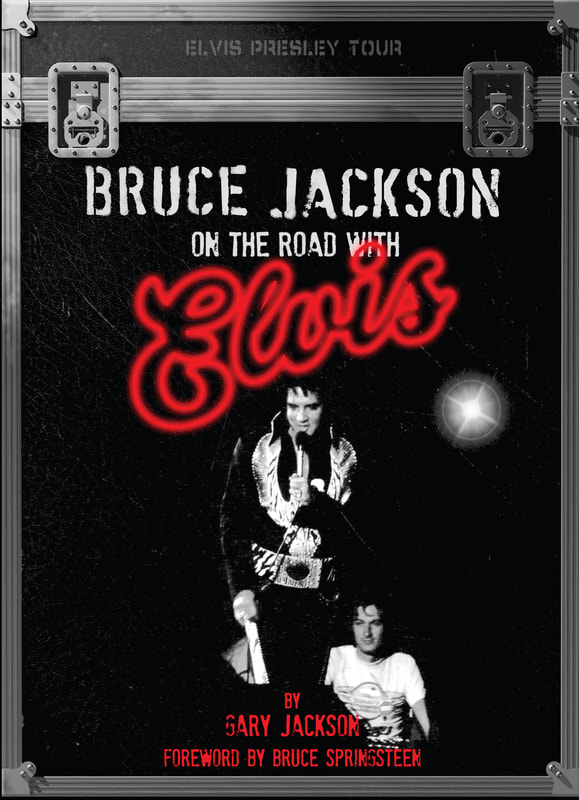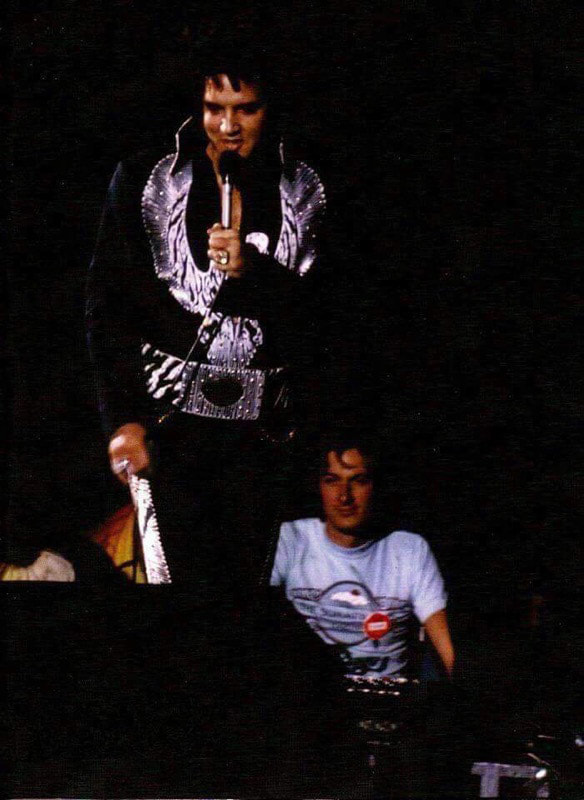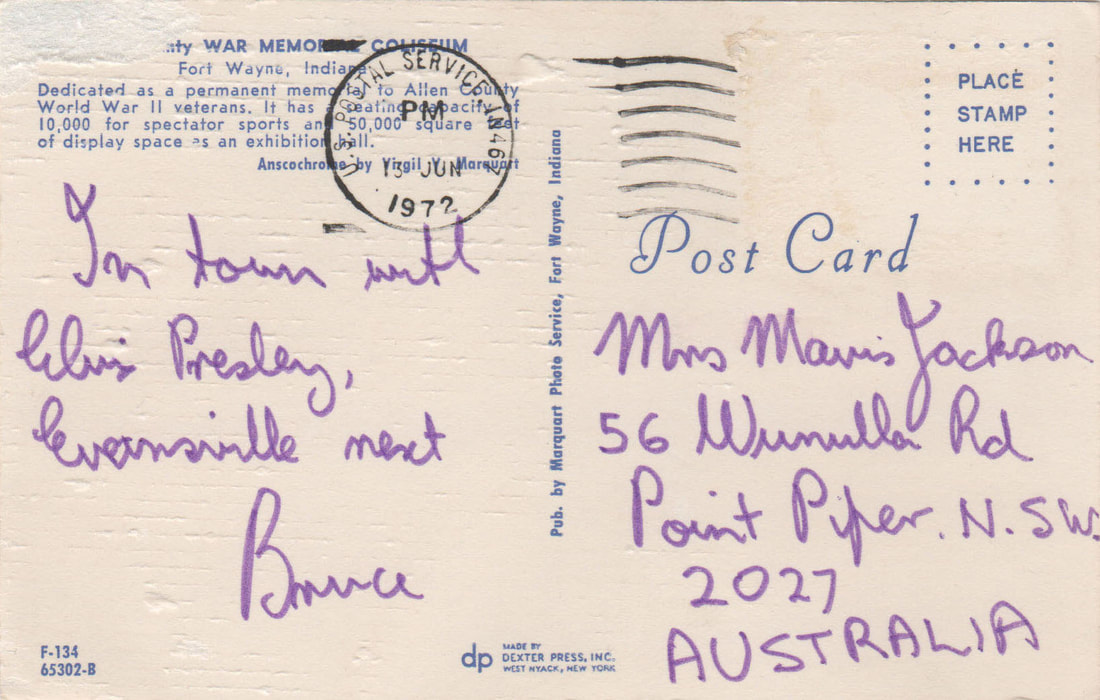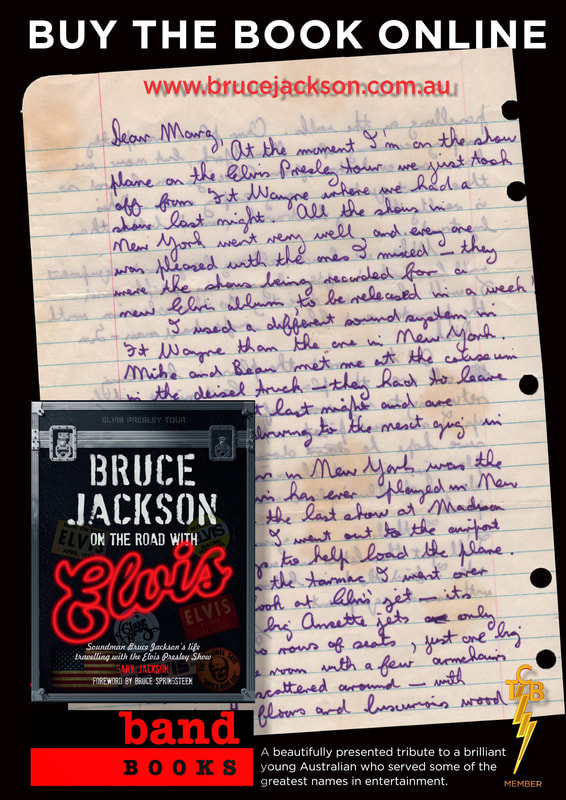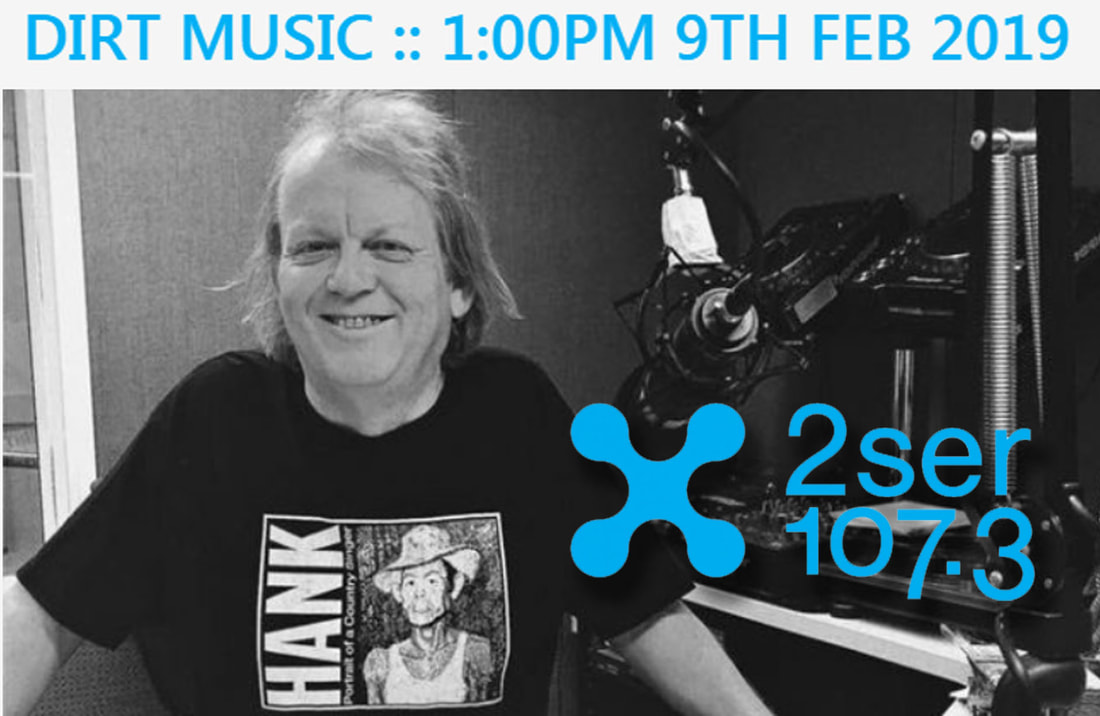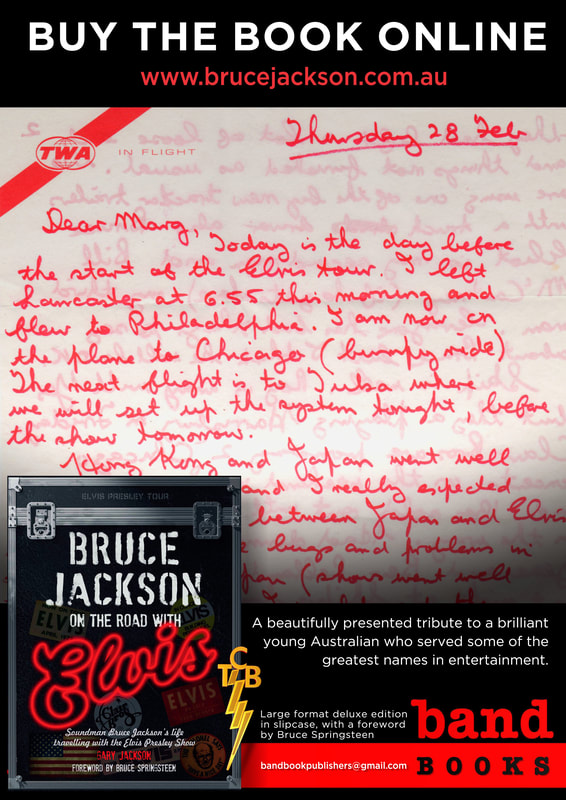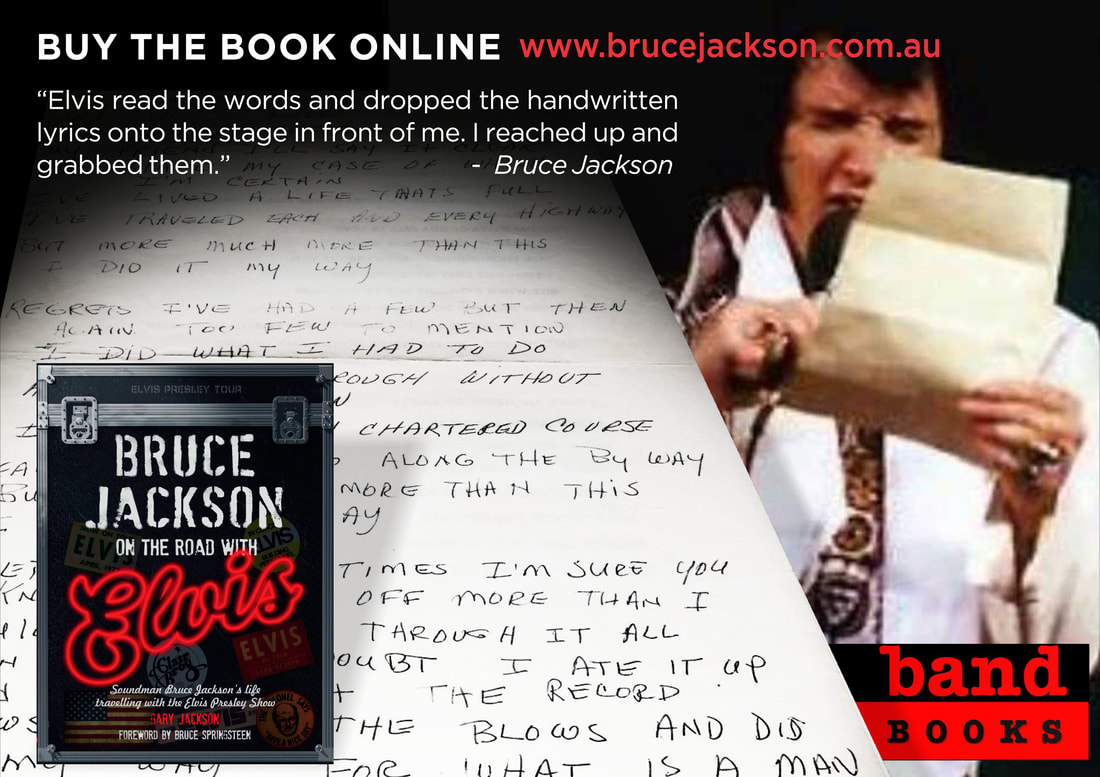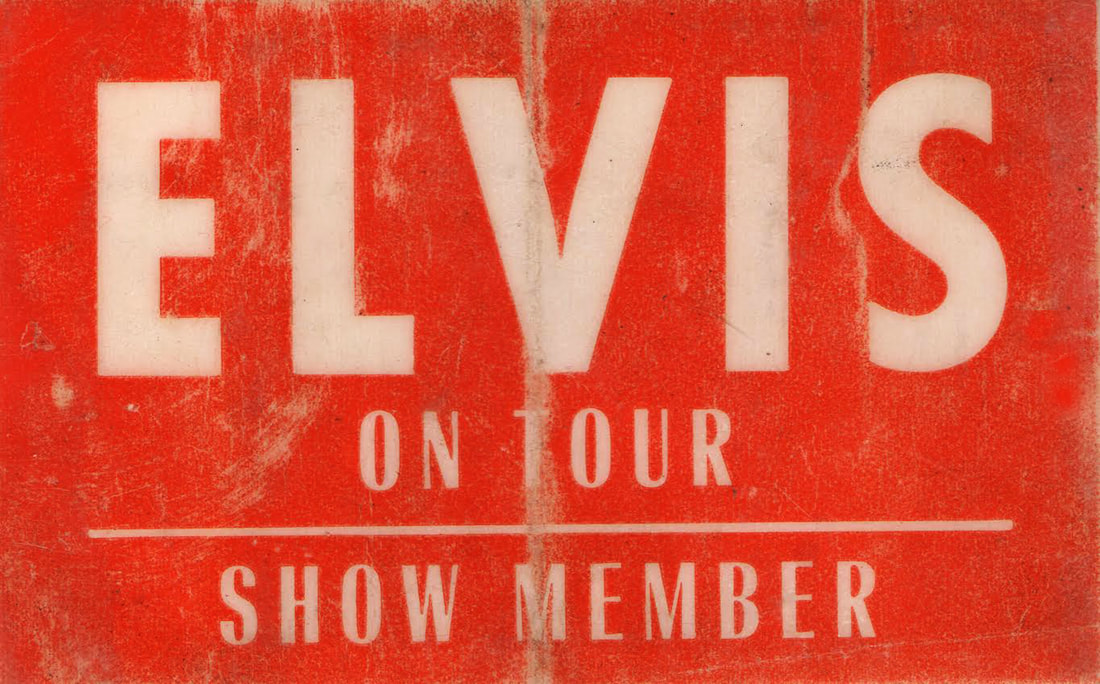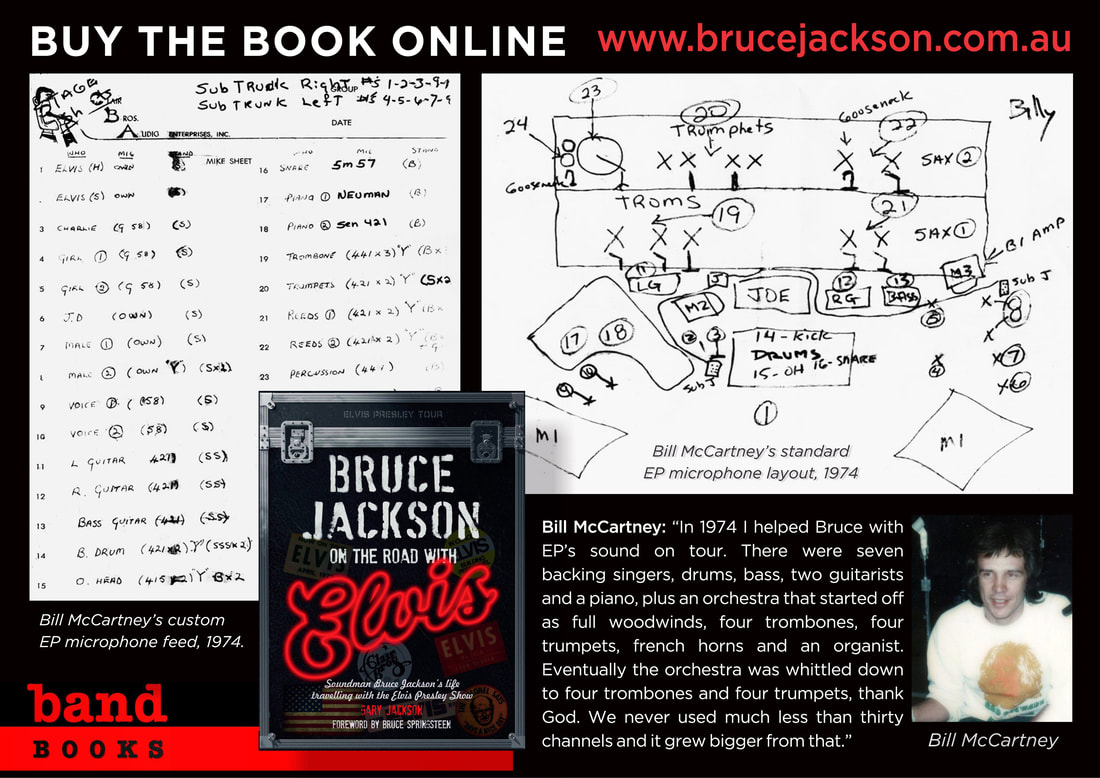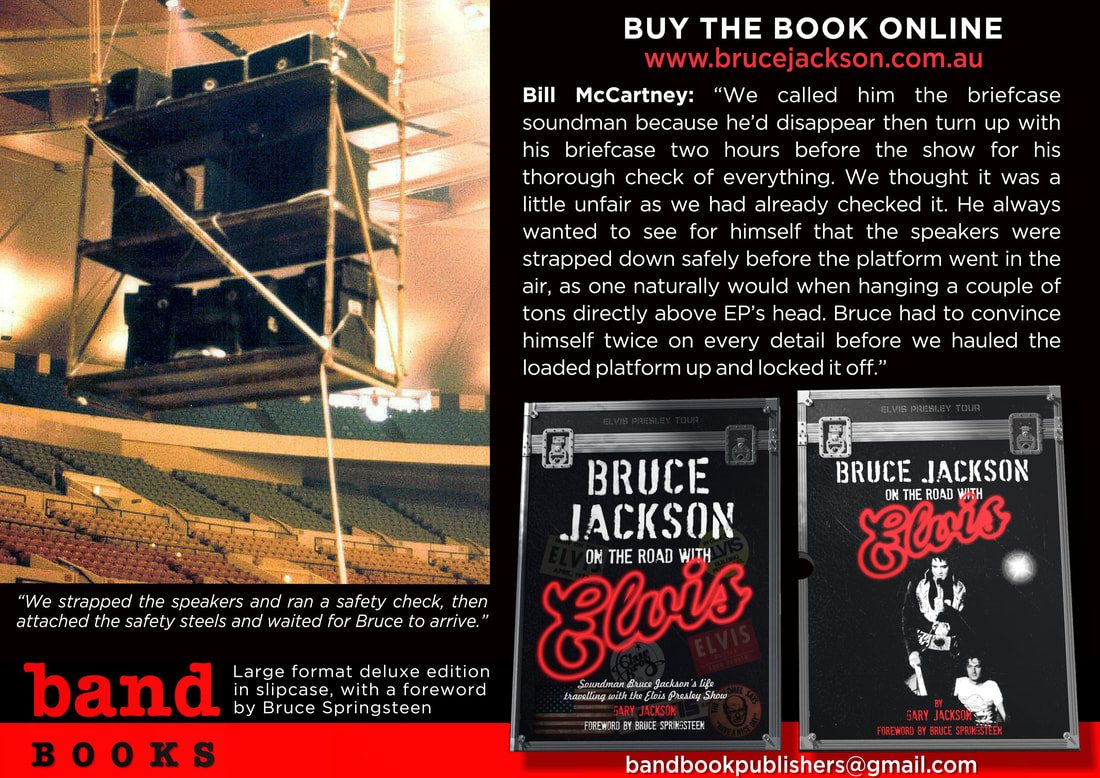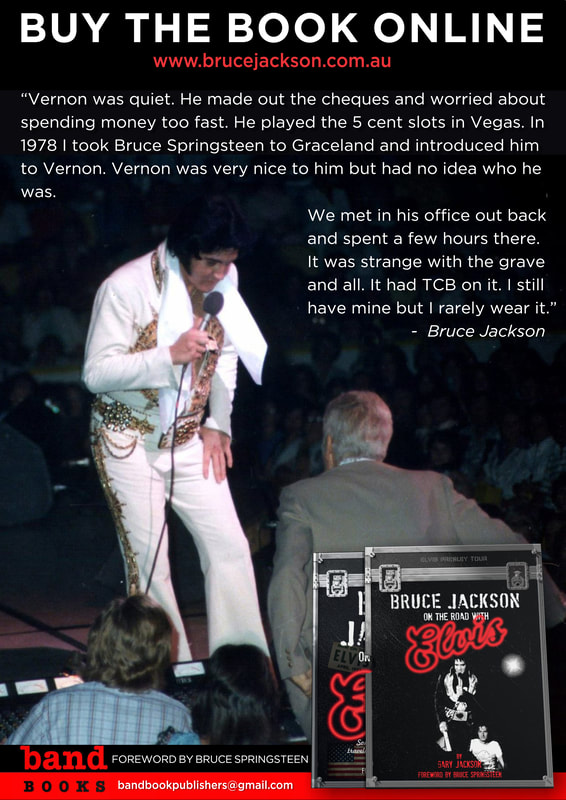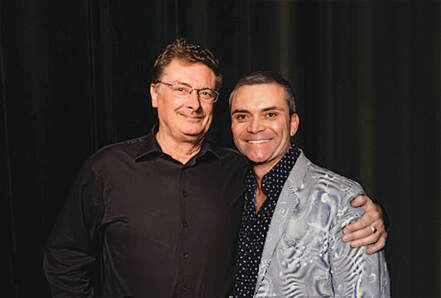|
Bruce Jackson with Elvis merchandising crew aboard Vickers Viscount, Summer 1975. Fake poker game with merchandising cash taken during the show. The guy with the cigar at top is Al "Elvis has left the building" Dvorin. Bruce Jackson is below Al with his best poker face, framed between the two cigars.
No time to relax on tour. The road crew helping the concessions crew rolling posters aboard Vickers Viscount, July 1975. Stan Horine, right
Keith Alverson's shot of Elvis in Atlanta, GA, Dec 30, 1976
Towards the end of the movie we see the actual Elvis do a heartbreaking version of Unchained Melody live.
Bruce Jackson, stage right. Felton Jarvis with him.
Atlanta, GA, December 30, 1976, by Keith Alverson.
The uplifting joy we experienced seeing this movie yesterday as the rain came down outside was further enhanced by the venue and its environment. Cinema Six at the Ettalong Paradiso on Brisbane Water has to be seen to be believed.
"I've got Elvis' guy! Elvis' man is working for me in the house!" - BS
After Elvis, Bruce Jackson worked with Bruce Springsteen and many more of the world's best bands throughout the unforgettable 80's.
|
OUR NEW BOOK IS IN PRODUCTION
February, 2024: We're still getting orders for our first book 'Bruce Jackson on the Road with Elvis'. We can't fulfill them as we sold every copy long ago. I suggested to a disappointed new customer yesterday that they might find a copy on eBay. Well, they are there but I can't believe the price. We were tempted to do a second print run but decided against it, preferring to put our energy into the next Bruce project, a comprehensive book on his entire career before, during and after Elvis. It is in production and should be out mid-year. We will take orders once we have a confirmed delivery date. Let us know if you want us to let you know. - Gary Jackson, BAND BOOK PUBLISHERS Just email your interest to me at gr.jaxn@gmail.com This will be a limited print run. Please watch this site for developments. POKER IN THE SKY with Elvis' cash
Duncan Putman worked for Bruce on Elvis tours as road crew. Duncan commented on the dodgy accent Tom Hanks used in playing Colonel Parker in the Elvis movie: "I thought Hanks' accent was so off. I remember the Colonel with a Southern accent as I'm sure he was trying to hide his Dutch heritage. Duncan recalls life on the road with the EP show: "Elvis tours had four aircraft when I was on the road with him in 1975 and 1976. Elvis flew on the Lisa-Marie, a Convair 880, the band flew a leased Boeing 727 or similar aircraft. The Colonel would be ahead of us advancing and flying in a small, probably single engine aircraft. The concession crew and the band road crew flew on an old Vickers Viscount turbo-prop. We almost always flew on the Viscount while Bruce Jackson, our boss and engineer, generally flew with the band on their aircraft. Occasionally Bruce would travel with us on the concessions plane. On one such occasion with Bruce aboard during a day flight that must have lasted a few hours, I asked Al Dvorin or one of the other concession guys how much cash they had on hand and was told “About $40,000.” Since there were card games going on often at one of the tables, I suggested putting a fake poker game together to flash the cash as if we were high rollers going to Vegas. Out came the cards, the cash and a few unlit cigars to set the stage. We had fun and at the time that $40 large was a lot of cash to have on hand. I wonder how much the merch. (merchandise) boys would make today if there were still Elvis tours selling all those scarves and posters?" - Duncan Putman A great review from the brilliant Bernie Howitt:
"Finally sat down to see Baz Luhrmann's Elvis today. The 160 minutes seemed to whizz by because you are drawn so deeply into it. As long as people don't get hung up on minor historical discrepancies and remember it's a movie, not a documentary, it's a fabulous film. The great gift of this film, as Glenn A Baker so rightly pointed out, is that it gives a post-Elvis generation the opportunity to see and understand the huge, earth shattering impact Elvis had in the 1950s. The first hour or so takes you right into the centre of the youthquake as Elvis Presley challenged the social status quo of a smug, self serving white supremacist, misogynistic society. If you want to understand why the last couple of weeks, where the US Supreme Court has attempted to recast the country, is so threatening, go and see Elvis and get a glimpse of the society they are trying to force Americans to retreat to. White, male, narrow minded and selfish. Elvis challenged all that by being himself. The film gives us all an opportunity to understand why rebel Elvis lost his way under "Colonel" Parker's tutelage. Austin Butler is seriously stunning as Elvis across time. He makes you believe, and that's why 160 minutes zooms by. Of course there are a couple of moments where you can't help but tear up, or is that just me? In 1968, the US and indeed the world, were threatening to tear ourselves apart. Elvis stepped into the maelstrom in his Comeback TV special and produced what I regard as his greatest ever vocal performance with If I Can Dream. It made me tear up then, and it still does, framed here perfectly in its historical and cultural context. The other moment was towards the end when we see the actual Elvis do a heartbreaking version of Unchained Melody live. If you're not moved, go straight to a cardiologist and get your heart checked! "I need your love, god speed your love to me..." There's nowhere to go after that. Magnificent." Elvis and the Colonel after work
By BJ “At two am on the night I was leaving Reno, after the second show, I was in his dressing room winding down from the show. He was just sitting there with his girlfriend, Linda, holding her hand, and Charlie (Hodge) was there. Charlie is the guy who hands him all his scarves and stuff, an old Army buddy. It's the first time I really had a good chat with Elvis. We just bullshitted about everything in general, like his plane, and his rings, and even ordinary things you don’t expect Elvis Presley to even think about. I was saying, 'You know it was amazing in Asheville, North Carolina when you threw those two rings worth about - whatever it was apiece - out to the audience. About $15,000 apiece. And no one reacted'. He said 'Yeah' and laughed. Ever since then when he's up on stage he occasionally plays with his rings and looks at me, as I had made the comment. He said that his ring box used to have a dozen of these rings in it, but now he's down to about three. He just gave them away, or they disappeared, as if he went through a very generous stage giving away all this stuff. And he had this ridiculous big ring on, with a monstrous clump of the biggest diamonds I've ever seen. He pulled it off and I tried it on and the damn thing was so heavy I couldn’t believe it. “It was just a really good bullshit session and he very rarely does that. He just sat there in the chair, kind of relaxed after the show, his gut hanging over his pants. I wish I could remember all the things we talked about, like his planes and how he selected his two pilots. Apparently he chose them both from their resume. It turns out they had worked together before, for years and years. Anyway it was good if not a bit surreal to talk with him at that level, and he's been quite a bit friendlier ever since. Not that he ever wasn't, but you know he knows me a little better too now. “It was around four am when I left him and Linda alone in his hotel room. Charlie had already disappeared. Elvis's bodyguard guys were sitting around in the room outside waiting to go to bed and all the hotel guards were there, almost asleep. I went down to my room and slept for about an hour. I had to leave early to take the bus down to Reno for my flight home so I was down in the lobby just after five. “As I waited for the bus inside the entrance foyer, Colonel Parker turned up and I gambled with him again. It was his idea. He gave me a few chips. He's strange: he said 'Give me a hundred dollars' and I thought 'What? I'm not giving you a hundred dollars' but you don’t say 'No' to the Colonel so I got a hundred dollars out and gave it to him and he bullshitted around and the next thing he gives me back two hundred dollars. I made a hundred dollars profit doing absolutely nothing. And he did the same thing again, he did it twice. I made two hundred dollars and paid for my vacation. Then I flew back home on a commercial flight to Philadelphia, then a commuter to Lancaster, noting well how much better it is flying on a Starship as part of the Elvis machine.” - Bruce Jackson Who? Who does not like the Elvis movie?
It would take a mean spirit to not be moved and invigorated. If more human endeavour was devoted to rewarding collaborative projects like this, the world would be a happier place. Inconsequential errors in the timeline can be overlooked as can Parker’s dodgy accent and likewise the inaccurate weakly-played Vernon can be heard saying ‘Gracelands’ but who cares? It works on every level and every credit at the end is deserved, particularly so by Austin Butler and everyone who helped make him into Elvis. There is only one mention of sound, when Elvis says he is ‘trying something new,’ referring to the LV Hilton in 1970. The ‘something new’ came with the November 1971 tour, when BJ went out on the road with the new Clair Console he had designed and built with Ron Borthwick and that’s when, with Elvis’ support, the revolution in live concert sound began. Bruce Jackson Now Taught in SchoolsThe second edition of OXFORD INSIGHT HISTORY for NSW secondary schools, Stage 5, has a section on Bruce Jackson's contribution to live sound, work that revolutionised the industry. Author Bernie Howitt has done an excellent job as usual. If only there had been books like this when I was at school. Here is the opening paragraph for your easy reading:
"The development of concert sound became a crucial element in the ongoing development of rock music as a popular culture. The 60s moved into the 70s, and rock music moved from dance halls into major stadiums and outdoor arenas. At the forefront of that technical development was an Australian engineer called Bruce Jackson. Moving from creating his own sound and lighting systems in Australia, Jackson helped revolutionise the way sound reached audiences. So successful was he that he became the sound engineer for Elvis Presley and Bruce Springsteen." Bruce Jackson's sound-mixing revolution
"We got there, eventually, and I took it out on the road on the first Elvis tour. It did everything I wanted. I used it with Elvis for six years and then - still good - with Bruce Springsteen through the eighties. The ten we built were the Clair (sound company) mainstay for a dozen years. It was the first live concert touring console to use parametric EQ."
- Bruce Jackson speaking about the development and application of the first multi-channel , portable, folding live sound mixing console for concerts. Quoted in, Bruce Jackson On The Road With Elvis by Gary Jackson, Band Book publishers, Australia, 2018, p82. School's out forever. Now back in school in print.
It was a memorable time in that era of unprecedented social and intellectual emancipation. The university textbooks were old and out of date, at least in electronics, where new rules were being written in solid state technology. Bruce and Phil Storey branched off on a new evolutionary path in that direction. Vacuum tubes were dead but that technology was still in those expensive textbooks. Anything was possible and there was the obvious choice: sprint ahead with the opportunity in front of you or stick with classes where you know more than the teacher and end up as a linesman up a pole or as an electrician wiring houses, fixing televisions, washing machines and toasters. Psychedelic visionary Roger Foley, as Ellis D. Fogg, provided the opportunity to apply the new technology to both a social and commercial good ... yet with great irony stay in touch with the university world via those sound and light shows. It was a little like our high school headmaster's advice to non-academic students to leave school early and get a job in the real world. I remember when Bruce was called into the Dean's office at UNSW to discuss his poor exam results. The Dean, with Bruce's interest in mind, advised him to pick another career as - and it wasn't his fault, the Dean assured him - not everyone is suited and has an aptitude for electronics. And so Bruce, and Phil for the same reasons, dropped out and applied themselves to JANDS and that's where the fun started.
'DJ' Jack Mullins did a great job. More coming.
BRUCE JACKSON AFTER ELVIS
Soldering on Bruce had started Apogee Electronics in 1985 with Betty Bennett, while still working and touring with Bruce Springsteen. Apogee was Bruce's second start-up but this one was made with more experience and professional connections under his belt than when he started JANDS in Sydney some twenty years earlier. Paraphrasing Marlon Brando in the movie 'The Freshman', Bruce knew people and could now 'kick open a few doors.' Way back in the late 1960s he'd rush home from school, change out of his uniform, eat a white bread sandwich filled with whatever he could find in the refrigerator that hadn't been there longer than one day, drink something carbonated and sugary and go to work in his tiny workshop under the house. The first project had been pulling an old cathode ray television apart to see how to make a green-glowing oscilloscope that he then used to diagnose by its varying sinusoidal wave patterns what was going inside the experimental electronic devices he was building and at the same time planning to build. It was the start of the solid-state revolution; gone forever were the powerful but fragile, bulky, slow to warm up and easy-to-break glass vacuum tubes, replaced by robust miniature components that cost just a few cents. You could command them to do anything if you knew what you were doing and what you wanted them to do. Bruce was a pioneer in applied solid-state electronics. He sat there at his work bench, shoulders slightly hunched, his brain out there in unknown territory designing circuit boards, simple at first and quickly growing more and more complex. He bought small sheets of soft aluminium that he fashioned with tin snips and rivets into simple chassis foundations. He'd print his circuit board designs photographically onto - as I remember - green, fibreglass reinforced epoxy resin substrate, with a copper foil bonded to one or both sides. Next he'd solder different colour-coded transistors, resistors, diodes, capacitors - and other tiny new-fangled components I didn’t recognise - at various places along the custom silvery tracks on the boards he would then attach to the aluminium chassis variously with self-tapping screws or rivets. These components working together came to life as brains that controlled inventions he'd build and rent out to provide lighting effects for university balls and dances in the psychedelic sixties … strange new machines like colour organs and the flashing stroboscopes that were alleged to cause epileptic fits but I never saw that happen at any of the scores of lightshows I conducted for his company JANDS. As the hire business took hold and started making good money for Bruce and his partner Phil Storey, Bruce's interest gravitated from light to sound and by the end of the decade when Armstrong and Aldrin were walking on the moon and Michael Collins was orbiting overhead doing challenging crosswords while waiting for them to come back, Bruce was miles away on Earth building amplifiers more powerful than the Saturn 5 rocket that took them there, so loud that they could ripple the water in the harbour on a windless day and shake the chandeliers and picture windows on neighbouring waterfront mansions. If he'd paid as much attention to his schoolwork he might have passed his final exams well enough not to have to repeat his final year, delaying by one year the start of his failed university electrical engineering course. I came across a description of George Orwell in an introduction in a Penguin edition of his book 'Down and Out in Paris and London' that struck me as describing Bruce at that time perfectly, 'He was not interested in further mental exertion unrelated to his private ambition.' Bruce was not alone, his workshop was a magnetic meeting place for like-minded electronics fellow-travellers from school who, after the 3:15 p.m. end-of-school hooter, would make their way down to our place on old Vespa Motor scooters or older cars or take a bus or walk and then sit or stand around comparing notes as they plotted an electronics future over beverages, home-made cakes and store-bought Arnotts biscuits supplied by our mother Mavis … and dinner with our family for anyone if they were still there at meal time, as a few of them often were. SOLD OUT!
Our 'Bruce Jackson On The Road With Elvis' book has sold out. Thanks to everyone around the world for your interest and support in making this genuinely applauded tribute to two great men a notable success. Our next project is well underway and promises to be an all-time Rock'n'Roll classic. Bruce Jackson was blessed to be able to contribute so much to the development of live concert sound in the golden age of touring, including the formative years of Bruce Springsteen and the E. Street Band ... and many more of the world's best bands and artists at the top of their game. Bruce Jackson took the time on the road and at home in his apartment in Lititz and then LA to record talking tapes that he mailed home to his family in Australia providing a unique perspective straight from the horse’s mouth. For sure the focus is on BJ as the protagonist, getting into his world to observe from his perspective ... hearing Bruce speaking openly and candidly, blending the technical with the humanist. It's all a celebration of something special and good that happened ... and chances are won't happen again. Throughout our research I have been amazed at the impact he made on the lives of those he worked with. I'm sure most if not all those we contact will not object to having their story told and preserved. That goes for everyone who played a part. Contact: bandbookpublishers@gmail.com - Authored by Gary Jackson, one of Bruce's two younger brothers. ANOTHER UNBOXING BY A RETAILER
Around the world, retailers treated our book with unusual reverence and goodwill. Here is another white-gloved unboxing (links to a video) BRUCE JACKSON MAKES HISTORY
Much-admired history teacher and author Bernie Howitt has given me a copy of the second edition of his richly illustrated, beautifully written and produced book 'OXFORD INSIGHT HISTORY FOR NSW', stage five. This is an inspired, intelligent and entertaining way to teach the NSW secondary Modern History syllabus. Any student reluctant to read textbooks will have no trouble getting into and reading this one cover to cover, all 590 fascinating pages. In the chapter titled 'HOW HAVE THE MUSIC, FILM AND TELEVISION INDUSTRIES CHANGED IN AUSTRALIA SINCE WORLD WAR 11?', a page on Bruce Jackson's ground-breaking work in live concert sound celebrates his achievements. Now every Modern History high-school student in NSW will know Bruce's name and what he did. If only social history had been taught this way when I was at school. We studied Australian history using Barnard's 'History of Australia' as a text. It was highly regarded then but in retrospect now was all convicts, explorers, sheep and wars in dry facts and text. Bernie's book wipes all that off the table and presents our social history in vivid living imagery. Every item in the book is something we want to know about. Bernie and his two co-authors have produced a work of art that is so good it would be a reading choice for anyone, in or out of school. You don't get the feeling that someone is trying to educate you, it's all a pleasure to read, page after page.
FEEDBACK FROM MATT IN GERMANY
"Dear Gary, I have spent a good part of the weekend reading through the book. Good writing, very personal (!) in the beginning and captivating throughout. Feels almost like being on the road and in the air with Bruce, heading from city to city. And what an extraordinary childhood and youth you guys had, wow! Also very interesting bits and pieces of new EP related information here and there. Has it been confirmed anywhere else that RCA was actually on site to record at Lake Tahoe in 1976? Did they go through with it? I am very happy and proud to finally own this gorgeous book and CD set, it really is the ultimate package. I listened to the CDs on Wednesday in a single sitting. Atlanta is a dream come true but Disc 1 was equally fun and entertaining (impressive mastering, Big Boss Man and Danny Boy are a major (!) improvement over the old releases). Jack Mullin's narration is top notch!. I especially enjoyed Bruce talking with his hotel TV running in the background and the audible noise coming in from the streets. Pretty cool - like a little window into the past. The design of the CD-Set itself is fantastic and it matches the artwork of the book beautifully. Thanks to Helen! This is the first FTD 3CD disc set in a 5" format, the first matte (non-glossy) disc cover and the first FTD release that features a documentary / spoken word content. And I guess it's also one of the first, if not the first international co-production. FTD should really engage more in projects like this and collaborate more openly. I'm not gonna ask for a second set of CDs on FTD (because that's what fans always do), but I'll keep my eyes and ears open :-) Thanks again! Best wishes from Germany, Matt" INTERVIEW WITH JACK MULLINS
DJ Jack Mullins, who produced a masterpiece audio documentary for the third CD of our three CD set, has been interviewed by the prominent Elvis Italian Collector Club. The interview is in Italian, click on any image to go to the Elvis Italian Collector Club site. Here is the English translation: Jack Mullins is a musician and Follow That Dream (FTD) contributor. He was recently commissioned to curate the book combo and CDs "Bruce Jackson: On The Road With Elvis" of which he narrates the documentary about the third diskette. It is a pleasure to have our guest to reflect on this exciting project, exclusively with the EICC. GC: Jack, thank you for agreeing to do this exclusive interview. Can you tell us a little bit about yourself and your musical background? Jack Mullins: I was inspired first of all by Elvis when I was a teenager getting on guitar, then I discovered other artists like Jefferson Airplane, Neil Young, Gordon Lightfoot, Led Zeppelin etc. More recently I have been part of numerous musical groups but I also do shows on my own. I also deal with video editing and dubbing. I love working with creativity and I consider myself very lucky to do this job. GC: How were you involved in this FTD work? Jack Mullins: I was doing a radio show a long time ago, and my friend Evan Mueller suggested that I interview Gary Jackson for my show, and it seemed like a great idea. I thought it would be a short chat to include in my program, instead it became a real episode that beat all the listening records of the radio station. Then I was asked to create a documentary for the FTD project that I'm very proud of. GC: Have you worked on the included soundboards? You had already worked excellently on the Madison Square Garden tape included with the FTD book of the same name. Jack Mullins: Thank you for the compliment. Yes, I also worked on these tapes: nothing radical. I tried to eliminate the rustle and other interference as much as possible, but tried not to take anything away from the sound atmosphere. GC: What was the most surprising moment of this project? Jack Mullins: More than surprising, it was enlightening to hear Bruce Jackson reflect on the moods and dynamics of what was happening around Elvis. I was struck by how honest and outspoken he is in his remarks, which is not often the case with people around Elvis. But it should be remembered that Bruce was not an employee, but a collaborator and innovator in his field as Elvis was. I also found myself liking the Sioux Falls show more than I imagined. Elvis gave a great concert and the old hits are paced at a more relaxed and less hasty time. Needless to say, how exciting it was to hear "Such a Night" from the Atlanta concert! GC: How much cooperation did you have from the Jackson family? Jack Mullins: Gary cooperated fully from the first moment. It was easy to communicate and we were both open to suggestions on both audio and other aspects of the project. GC: Are you aware of what else the Jackson family has in terms of soundboards? Jack Mullins: As a fan I wish I knew, but I don't know. The book talks about 600 recordings, but I don't have a complete inventory, unfortunately. GC: Do you know if the Jackson family is going to share more tapes (if any)? Jack Mullins: Unfortunately not. I take more care of the creative side, so I'm not involved in plans for the future of the Jackson or FTD family. GC- Are you working on future FTD projects? Jack Mullins: I can't wait to start another project and collaborate with FTD again! Being involved in this exciting work was beautiful. Now "Bruce Jackson: On The Road With Elvis" is coming out, then we'll see what the future holds for us. GC- Jack, thank you for your availability and good luck with future projects! JANUARY 1 2021: HAPPY TO SAY THAT OUR BOOK + 3CD OFFER VIA FOLLOW THAT DREAM HAS ALL SOLD!
Click on either pic to watch video OFFICIAL ANNOUNCEMENT: COMING IN FALL VIA FTD
"FTD will be making Gary Jackson's book, 'Bruce Jackson On the Road with Elvis' available with a 3CD set, comprising a companion audio documentary hosted by me, plus a soundboard recording of the Sioux Falls concert on October 18, 1976, and - for the first time ever - a soundboard from Bruce’s own collection ... Atlanta December 30, 1976. Check out the promo videos. Many thanks to Gary, as well as Ernst at Follow That Dream for allowing this to be possible. I'm so thrilled to be a part of this!" - DJ Jack Mullins |
Click on the plectrum to buy the book.
|
"We called him the briefcase soundman because he'd disappear then turn up with his briefcase two hours before the show for a thorough check of everything. We thought that was a little unfair as we had already checked it. He always wanted to see for himself that everything was safely strapped down before the platform went into the air.' - Bill McCartney
Two tonnes of audio equipment hung over EP's head. Click on either pic to buy a copy of the highly-acclaimed book about Bruce Jackson's life on the road with the Elvis Presley Show.
Wembley, 1988
This gloriously illustrated book emerges as a unique source book for understanding Australian social and cultural history.
Click on image to play video
|
'Bruce wanted to convince himself twice of every detail before we hauled the loaded platform up and locked it off' - Bill McCartney, Bruce's right-hand man
Flying the speakers was Bruce Jackson's idea, used originally for Elvis and now of course adopted universally at every live concert. Bruce said he was at a 'Disney World On Ice' show and noticed that the speakers were suspended. Of course … they had to be suspended because you can't put speakers on the ice. He adapted the idea when Elvis went on the road in 1971.
Getting the speakers off the ground appealed to Colonel Parker because it made room for more seats. In the early days the speakers were strapped onto a platform then hauled up with chain motors, the same motors that factories used to lift a roller door, turned upside down. They were hard to rig, hard to control, hard to keep the platform level. Sometimes those early motors were not strong enough to lift the load. 'Looking back, it was a little dangerous to have a couple of tonnes of heavy audio equipment suspended directly above Elvis' head. We were developing and improving things all the time. If you ever marvel at the hanging speakers that provide the crystal sound in the Concert Hall of the Sydney Opera House, or the hanging curved arrays of multiple speakers at any concert anywhere in the world, thank Bruce Jackson.' - Bill McCartney BRUCE JACKSON'S HISTORICAL LEGACY NOW SITS A LITTLE FIRMER THANKS TO THIS STUNNINGLY BEAUTIFUL BOOK PRODUCED BY HIS BROTHER GARY
Rock music fans will know that Bruce Jackson went on to work for Bruce Springsteen as he claimed Elvis' live music throne as the epitome of American rock’n’roll. Jackson’s skill was pivotal in that ascendency, and shows that this unsung Australian was a crucial figure in providing the pulse for rock’n’roll to emerge as a behemoth of popular culture by the 1980s.
It was Jackson who provided the sound for the opening and closing ceremonies at the Sydney Olympics. If you ever marvel at the hanging speakers that provide the crystal sound in the Concert Hall of the Sydney Opera House, thank Bruce Jackson. His premature death piloting his single engine plane in Death Valley in 2011 robbed the world of one of Australia’s brightest talents. Jack's Elvis Tracks: Bruce Jackson Special
Elvis Fans! In a special edition of Jack Mullins' radio program Jack's Elvis Tracks on Saturday, Jan 18 at 7pm US Eastern/4pm Pacific (11am Sunday January 19 on Australia's East Coast), Jack explored the legacy of Bruce Jackson, Elvis’ soundman. Jack plays a few short audio clips from Bruce's soundboard of Elvis' December 30, 1976 show in Atlanta. Such a night! Elvis was in fine form.
By arrangement with Jack Mullins we've made Jack's entire Bruce Jackson Special radio show available for free download on the Bruce Jackson On The Road With Elvis Facebook page. Enjoy! Get a copy of the book for the full story.
JACK'S ELVIS TRACKS
BRUCE JACKSON SPECIAL Jack Mullins Bruce Jackson Special has been well received worldwide by a record audience. Download the entire show here including three short excerpts from the soundboard of Elvis' show in Atlanta on December 30 1976. Such a night! Elvis was in love and in fine form.
"WE SANG HAPPY BIRTHDAY TO ELVIS"
"I was there. The local fan club - Happiness Is Elvis - had organized it. They brought a birthday cake and got permission from the stage guards to bring it to the front edge of the stage. Lit the candle and got Elvis' attention. He and the band stopped and the fan group started singing and then the whole audience joined in. It was an incredible moment and amazing to hear. I was so excited to get to sing Happy Birthday to him. He was clearly touched."
- Tina Smith, Atlanta "I DID HUNDREDS OF SHOWS WITH ELVIS"
"Bruce Jackson may not be the first name you think of when you think about rock’n’roll, but if you’ve ever been to a live show, you have become part of his enduring legacy. He is one of the most significant but least heralded Australian contributors to the success of rock’n’roll as a popular culture. His technical wizardry helped revolutionise the sound you hear every time you go to a concert.
Bruce Jackson’s historical legacy now sits a little firmer thanks to this stunningly beautiful book produced by his brother Gary. At one, simple level it is the story of a boy with an interest in electronics and music who defied the conventional path of becoming an electrician, dropped out of uni, established a sound production company in Australia, joined an American sound company, and ended up working with Elvis. As this gloriously illustrated book reveals however, the full story is much more complex, and emerges as a unique source book for understanding Australian social and cultural history. FOREWORD BY BRUCE SPRINGSTEEN
“When I first met Bruce Jackson I only knew two things about him. I knew that he had worked for Elvis, which I thought was great, and that he was Australian. I don't think I knew any Australians and we started working together and he did the sound and I learned very early on that Australians are unique.
He had ultimate patience. For many tours we did every single thing we could to give our audience the best sound that was possible. He revolutionised the approach to my sound on stage. Working with him was funny, because he was an engineer. Engineers can be abstract, hard to get a hold of their mind. But the other side of Bruce was, Bruce was very, very loving. He was very warm. He had Australian irony. He was also sentimental. He'd get choked with emotion, you know, if you were at the end of a tour and told him how great the sound was he had put his heart deeply into his work. But at the end of the day he was just a good friend, he was a lovely friend of mine." - Bruce Springsteen Bruce Jackson On The Road With Elvis is a large format (240 X 315mm, 210 page) beautifully presented hardback book printed on premium, semi-matt art archive paper with a custom made slipcase. This original account of a remarkable Australian's life is also a fresh, new insight into the life of Elvis Presley. This highly-acclaimed book featuring many original photographs from the Jackson family collection has been welcomed by Elvis' fans around the world.
|
|
FIRST RELEASE:
1976 TOUR DIARY CD US$25 + postage First release of the entire 1976 TOUR DIARY compered by Jackie Kahane. This was a private TCB-member-only end-of-tour party. Jackie creates the impression that Elvis will be joining them, for the first time ever ... but it is Felton Jarvis who turns up instead, dressed in one of Elvis's jumpsuits to the usual Elvis fanfare. Felton throws out scarves and does a brilliant job of imitating Elvis and answering Jackie's questions in character. A raw, uncensored but totally respectful tribute from the cast and crew to their much-loved boss - even Elvis's girlfriend was there and laughing her head off - but of course in the nature of roasts like this one, everyone who was on tour comes in for humorous comment and the language can be confronting at times but understandable in the among-friends context. Remember this was forty years ago and many social attitudes from back then have now changed.
REPLICA BACKSTAGE PASSESELVIS PRESLEY SHOW US$20 + postage
Tour crew backstage passes were among the many items Bruce collected from the more than 600 shows he did on the road with Elvis. A4 sheet of 7 stickers from the Bruce Jackson collection, printed on premium adhesive PhotoTex stock. Pre-cut. peel-off, re-positionable.
|
|
"There was a bloke called Bruce Jackson from Sydney who was a genius. He grew up in Vaucluse and in the late sixties started getting into sound. In about 1971, when he was just 22, he became the sound engineer for Elvis Presley"
"Bruce should be a household name in Sydney. I think he is an absolute legend. He revolutionised Elvis Presley's sound. He was the first person to put the speakers up off the ground, and fly them from scaffolding. He did a whole lot of stuff for Elvis Presley. Elvis absolutely adored him. And then after Elvis died in 1977, this bloke became Bruce Springsteen's front of house guy. A lot of the sound and techniques in common use today come from elements that Bruce developed". Robbie Buck, ABC Radio, Australia |
|
Me and Bruce in Auckland, New Zealand in 1983. The story is told in my voice as his younger brother.
|
Sydney boy Bruce Jackson was Elvis Presley's soundman on tour for six years from 1971 until Elvis's death on August 16 1977. Bruce Jackson then worked for Bruce Springsteen on tour for more than ten years. In 1988 Bruce quit touring to build a new company APOGEE. Following an 'offer he couldn't refuse' from Barbra Streisand's manager Marty Erlichman, Bruce was pivotal in coaxing Barbra Streisand back onto the stage after a 27 year absence, for which he won an Emmy. Along the way he also toured with most of the biggest names in the business at the top of their game, including The Jackson Five; Blood, Sweat and Tears; Glen Campbell; Johnny Cash; Rod Stewart; Carly Simon; James Taylor; Fleetwood Mac; Stevie Nicks; The Rev Al Green; Art Garfunkel; Cat Stevens; Black Sabbath and many more. He was also Director Of Sound for the Sydney Olympics, redesigned the in-house sound for the Sydney Opera House and the Hollywood Bowl. Bruce's numerous inventions and technical innovations changed forever the way concert sound is heard, as those with industry experience will be aware.
Bruce died piloting his own plane in Death Valley, California, in 2011. He left behind a trove of letters, audio tapes and memorabilia. My partner Helen and I have used these artefacts to painstakingly author this work. |
|
ELVIS SINGS HAPPY BIRTHDAY TO BRUCE
June 3, Fort Worth, 1976. "I don't know how he knew it was my birthday. He came over, shook my hand and said, 'I want to wish you a happy birthday, Bruce.' The group broke into happy birthday music accompanying him as he sang to me."
Click on the plectrum or the image to see the video
and hear Elvis sing Happy Birthday to Bruce |
"This is a beautiful primary source that should grace the libraries of all schools that still put books in them. For teachers it will provide insights and sources that will make lessons more enriching. For students it will allow them to dream that all things are possible, and that is a most precious gift." - Bernie Howitt, NSW History Teachers' Association
Feedback from a customer in Gymea, Sydney: "Love the book but at 2kg it's too heavy to read in bed."
Feedback from a customer in Gymea, Sydney: "Love the book but at 2kg it's too heavy to read in bed."
We had an opportunity to talk about the book live on national television on the CBS TEN Network's Studio 10 morning program in Sydney.
If Elvis sang Happy Birthday to you - it'd be pretty cool right? Yes, is the right answer. Bruce Jackson was Elvis' right hand man. His brother Gary has written a book about his bro and Elvis. Myf Warhurst found out more...
Kick off your afternoon with Myf and a great mix of music, culture and everything in between. Meet the people creating the art that helps us make sense of the world, celebrate the classics and discover new music that you need to know about right now. ABC702
Felton Jarvis sits stageside with Bruce Jackson as Bruce mixes stage monitors
in close communication with Elvis.
in close communication with Elvis.
Bruce Jackson was Elvis Presley's touring soundman for six years. On July 5, 1976, in Memphis at the end of a tour, Elvis gave Bruce a gold TCB necklace and welcomed him to the inner circle, adding that it was long overdue.
Raised in a castle overlooking Sydney Harbour, Bruce Jackson dropped out of university course in 1968 to build stroboscopes, amplifiers and colour-organs for the emerging psychedelic light show culture. Little did he know that in just three years he'd be on the road managing Elvis Presley's sound and poised to change forever how live concert sound was presented. In six years with the Elvis Presley Show Bruce established a close professional and personal bond with Elvis who trusted him implicitly to deliver the best sound possible. Bruce's inventions and technical advances were adopted by the entire live concert touring industry.
Bruce was killed flying his own plane in Death Valley, California in 2011. He was a keen collector of memorabilia and left a haunting day to day record of his life on the road in postcards, letters and talking tapes. I've used them plus interviews with his colleagues and my own experience as his younger brother to write a fitting tribute to both men. The book delivers an intimate, engaging narrative of Bruce's extraordinary life, up close with the world's top performer. After Elvis died, Elvis-fan Bruce Springsteen hired Bruce Jackson, saying "I've got Elvis's guy...Elvis's man is working for me in the house." - Gary Jackson
Bruce was killed flying his own plane in Death Valley, California in 2011. He was a keen collector of memorabilia and left a haunting day to day record of his life on the road in postcards, letters and talking tapes. I've used them plus interviews with his colleagues and my own experience as his younger brother to write a fitting tribute to both men. The book delivers an intimate, engaging narrative of Bruce's extraordinary life, up close with the world's top performer. After Elvis died, Elvis-fan Bruce Springsteen hired Bruce Jackson, saying "I've got Elvis's guy...Elvis's man is working for me in the house." - Gary Jackson
|
The hardcover book comes in a custom slipcase
|
SOUNDMAN Bruce Jackson's LIFE TRAVELLING WITH THE ELVIS PRESLEY SHOW"Bruce Jackson was the sound guy from central casting. Tall, good looking, and Australian. He knew more about audio electronics than anyone I ever met. He made his clients sound their best, and then some. He had a mastery of live audio that is impossible to explain. Bruce spoke to Elvis like a normal person. He gave the mega-star the reassurance he needed before a show." - Julius Grafton, publisher CX Magazine, the trade journal for the live audio and lighting industry in Australia.
Years of work have gone into making this book a fitting tribute. Bruce's first person narrative and contributions by friends and colleagues plus the eye-witness perspective of his brother Gary come together for an extraordinary insight. This is, incredibly, a new look at Elvis by someone who worked with him in a professional relationship that evolved into a personal friendship. |
Terra Haute, Indiana. July 9, 1975. Bruce mixed stage monitors for hundreds of shows on
the road, so close to Elvis that he could talk to Bruce during the concert, and he often did.
the road, so close to Elvis that he could talk to Bruce during the concert, and he often did.
“I mixed and ran the sound for Elvis for six years until his death on August 16 1977. I was 22 when I started working for him. It didn’t seem like a big deal at the time, working strange hours and constantly on the road to the next city or town. I did hundreds and hundreds of shows with Elvis across mainland United States and Hawaii.” - Bruce Jackson
"This is a book about a brilliant, flawed and fascinating human who served some of the greatest names in entertainment. Bruce lived as a teenager in one of Sydney's most opulent harbour-side mansions, yet he was just like a common man.
He didn't much care about diplomacy. He called a spade a shovel and could make the rational arguments that opened up tight budgets controlled by tight managers.
He died in an unexplained accident while piloting his beloved Mooney single engine airplane in Death Valley, California.
This book is an important work of history, and a labor of love by his younger brother Gary. I know well the breadth of research and fact-checking that has gone into these pages. Bruce's uncommon letter writing and photography, along with carefully kept audio tapes opens up a window into an era that the world will never see again." - Julius Grafton
He didn't much care about diplomacy. He called a spade a shovel and could make the rational arguments that opened up tight budgets controlled by tight managers.
He died in an unexplained accident while piloting his beloved Mooney single engine airplane in Death Valley, California.
This book is an important work of history, and a labor of love by his younger brother Gary. I know well the breadth of research and fact-checking that has gone into these pages. Bruce's uncommon letter writing and photography, along with carefully kept audio tapes opens up a window into an era that the world will never see again." - Julius Grafton
|
Stuart Coupe hosts Dirt Music Saturdays at 1pm
|
Seems a lot of people dug the Dirt Music radio show on 2SER this afternoon. The first hour was a look at the career of Australian sound engineer Bruce Jackson who worked with Elvis Presley and Bruce Springsteen amongst others. Joining me in the studio was his brother Gary Jackson who has written and assembled an amazing book on Bruce's life and career. |
BRUCE JACKSON ON THE ROAD WITH ELVIS is now available, online and in selected retailers. It's a beautiful book. An extraordinary tribute to Bruce Jackson and Elvis Presley.
Bruce Jackson: On The Road With Elvis is a warm-hearted biography written and creatively directed by Bruce’s brother Gary Jackson, with a foreword by Bruce Springsteen. It details his unconventional upbringing in a castle on Sydney Harbour (run as a boutique hotel by his parents), through to the formation of Aussie sound company JANDS in the late 1960s when he was still in his teens (he was the ‘J’ and Phil Storey the ‘S’ in J-AND-S) before heading to the USA to become a live sound man for the biggest stars of the day.
Bruce became Elvis Presley’s live sound engineer at the age of 22 during Presley’s hard-touring 1970s, working his magic behind the sound desk until The King’s death in 1977.
In the 1990s, amongst hundreds of other top acts, Bruce most notably became Barbra Streisand’s sound man on several tours and filmed specials, using a microphone modified with a RØDE capsule that RØDE Chairman and Founder Peter Freedman AM had custom-made for him, dubbing it the ‘Jackson Special’.
An accomplished pilot, Bruce died tragically in an aircraft crash in 2011.
Bruce became Elvis Presley’s live sound engineer at the age of 22 during Presley’s hard-touring 1970s, working his magic behind the sound desk until The King’s death in 1977.
In the 1990s, amongst hundreds of other top acts, Bruce most notably became Barbra Streisand’s sound man on several tours and filmed specials, using a microphone modified with a RØDE capsule that RØDE Chairman and Founder Peter Freedman AM had custom-made for him, dubbing it the ‘Jackson Special’.
An accomplished pilot, Bruce died tragically in an aircraft crash in 2011.
|
Bruce Jackson and Peter Freedman AM at Peter’s 50th birthday, 2008
|
“Bruce Jackson was a bona fide pioneer of Australian pro audio,” says Mr Freedman. “He was an innovator and a genius, really. Over the years he was also a dear friend to another young sound man – me! – generous with his knowledge and support during key times in my professional life. Making the ‘Jackson Special’ for him when he was working with Barbra Streisand was an honour and a real source of pride for the RØDE team in our early years.
“Bruce Jackson: On The Road With Elvis is a tremendous tribute to Bruce’s life and work, providing incredible insight into the man on a personal level, and the technical genius his innovations proved he was. It’s also a very cool coffee table book and a must-have for Elvis fans and audio pros – every studio should own a copy. Congratulations, Gary, on a terrific celebration of a legend.” Bruce Jackson: On The Road With Elvis by Gary Jackson is available at brucejackson.com.au |
